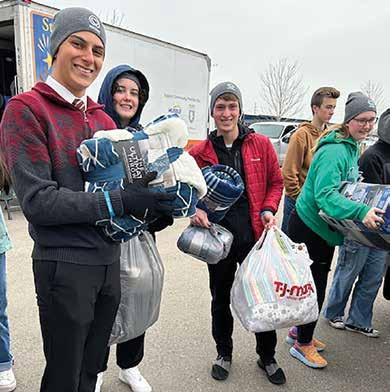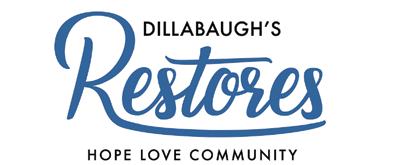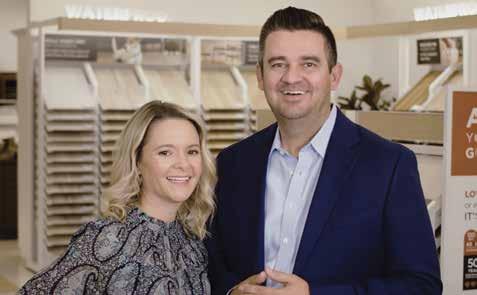


















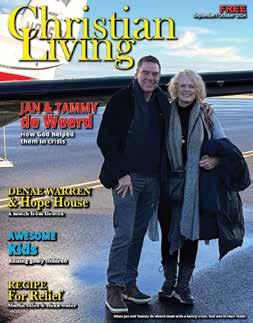

PUBLISHER
Sandy Jones • 208-703-7860 christianlivingmag@gmail.com
EDITOR
Gaye Bunderson
editorgaye@gmail.com
Submit story ideas, article submissions & press releases
GENERAL INFO
christianlivingmag@gmail.com 208-703-7860
ADVERTISING & SALES
Kimberly McMullen • 208-703-7509 kim.bcliving@gmail.com
GRAPHIC DESIGN
Denice King • 208-918-5190 www.greentreedkdesign.com
Larry Banta, Steve Bertel, Daniel Bobinski, Rick Chromey, Tom Claycomb III, Ryan De Amicis, Roxanne Drury, Joan Endicott, Leo Hellyer, Megan Hill,Rosie Main, Gary Moore, Bethany Riehl, and Janet Thompson


By Sandy Jones
I’ve had a couple of people ask me what I meant by “friendly fire” a few weeks ago when I posted “Beware of Friendly Fire - I always have to remind myself to try hard to not be the one pulling the trigger!” on my personal Facebook page.
The term “friendly fire” started as a military term, where a soldier is accidentally shot by one of their own.
I was using it in the terms of how often I witness fellow Christians hurt one another.
I’ve seen and/or heard Christians who profess to love the Lord completely dress someone down over their political views, or, my personal pet peeve, whether or not they chose to wear a mask.
Politics. We’re asked to vote for another human being. I think we need to be cautious to not make any human being a god. There is only one God, and we need to be careful to not worship any human being. Lest we forget there will come a day when “every knee shall bow, and every tongue confess,” and I, for one, don’t want The One to ask me about idol worship.
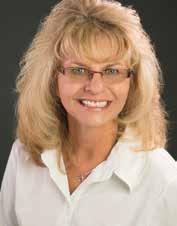
Another form of friendly fire is mocking and ridiculing people who don’t agree with us politically. Trust me when I say that bullying someone over political differences damages your witness. And masks? Please don’t get me started. My opinion is as simple as this: if someone wants to wear a mask, let them. People have been wearing masks for decades, and before Covid nobody thought twice about it. We need to quit picking on people over this too – it doesn’t impact the observer one bit, but ridiculing and mocking does damage one’s testimony.
It is my understanding that we are called to be disciples, leading others to Christ by both our words and our actions. Sharing our opinions and beliefs are our right, but it hurts my heart when I so often see or hear people carelessly putting others down for not agreeing with them. I can only imagine how it must break God’s heart.
I remind myself this behavior is not the brotherly love Jesus Himself commanded us to show one another. I’m sure the Samaritan wasn’t fond of the things the Jewish man stood for, and they certainly didn’t agree religiously or politically; but when the Samaritan came across the injured Jewish man on the path that day, he stepped

in to help, and did so lovingly. I, personally, want to be more like the Good Samaritan.
I realize this is not my normal Publisher’s Corner, but as I walk through this topsy-turvy world we’re living in these days, I believe that it’s time to challenge myself, as well as my brothers and sisters in Christ, to be more concerned with other people’s eternities than literally anything else that does not impact their eternity. I frequently remind myself that there’s only room for one butt on God’s judgment seat, and it’s not mine!
We have friends who have served most of their entire adult lives in the mission field. My husband asked them one time how or why they’ve done this – live overseas, mostly in Third World countries, and away from their families all these decades. Our friend’s response was life-changing for both Steve and I, and I’m paraphrasing here, but his response was basically “we get to tell people about Jesus, and what could be more important than that?”
He was right. What could be more important than that? I’m often reminded by watching these same missionary friends that you can preach an entire sermon series by your actions and deeds, without ever speaking a word.
As we head into fall, and all of the upcoming holidays and events, I’m going to do my best to try to see others through God’s eyes, reminding myself that He loves them unconditionally, just as He loves me. I hope you’ll join me.
Until next time,
God Bless! n
Speaking of using your words. May I please request that you frequent our advertisers, and thank them for supporting the ministry of Christian Living Magazine? We simply cannot do what we do without them. They are passionate about supporting us, and helping us to bring you the hope and promise of God’s love, grace and mercy.




By Leo Hellyer
Editor’s note: The following column is the author’s take on the importance of voting. As stated in the article, he is not endorsing a candidate but is upholding the right to participate in democracy by exercising the right to cast a ballot.
I can unequivocally say that the United States of America is the greatest nation in existence today. We need men (and women) of all ages, in all communities, at all levels of organizations and government agencies to step up and lead as people of God. Across the board, our nation is at a vital crossroads of historic proportions.
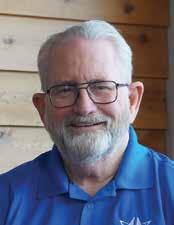
As I continue to lead you in this column, rest assured, I am not going to suggest who you vote for, or what stand you should take on any issue. I hope to lead you to honestly examine what issues are important to you as you exercise your right to vote for the future of our society. To guide us in this process I have chosen two Scriptures to lay the foundation for our deliberations.
Romans:13:1-2 reads: “Every person must obey the leaders of the land. There is no power given but from God, and all leaders are allowed by God. The person who does not obey the leaders of the land is working against what God has done. Anyone who does that will be punished.”



Once a person is elected to the office of President of the United States, or any other office, we must believe and respect the fact that God, for whatever reason He chooses, has allowed this person to be in the office that they were elected to, at this time. Maybe He wants to heal our nation, maybe He wants to make our nation more powerful, or maybe He wants us to learn something.
Philippians 4:6-7 says: “Be anxious for nothing, but in everything by prayer and supplication, with thanksgiving, let your requests be made known to God; and the peace of God, which surpasses all understanding, will guard your hearts and minds through Christ Jesus.”
We need to be in fervent prayer for our nation and our nation’s leadership. Our nation will not thrive without God’s blessings. It is up to each of us to “let our requests be known to God”.
This great nation, unlike many other nations, has a rich tradition of peaceful transition of power throughout our history. Each of us as citizens has the right and responsibility to vote our mind and thereby guide this peaceful transition of power. Does this mean that we always are thoroughly happy with the outcome of every election? No. But we let the process of democracy run its course. Does it mean that when we don’t get our way in the election, we threaten to leave the country? No, we try to redirect our nation from wherever we are, physically, politically, and spiritually.
Continued on page 7


By Daniel Bobinski
Lions and lambs are among the most popular symbols in Scripture. When we think of lions we think of strength, authority, and stature. That’s because a lion’s majestic presence commands respect and awe. Thus, lions are an apt metaphor for the qualities of leadership and rulership.
Conversely, when we think of lambs we get an image of innocence and gentleness. Sheep are, by nature, nonconfrontational.
Most students of Scripture know that Jesus is referred to as both a lion and a lamb, so let’s start our examination of these metaphors with Jesus.
In the fifth chapter of the Book of Revelation we see Jesus referred to as a lion: Then one of the elders said to me, “Do not weep! See, the Lion of the tribe of Judah, the Root of David, has triumphed. He is able to open the scroll and its seven seals.”

The imagery of Jesus being a lion stems from the blessing given by Jacob when he blessed his sons before his death in Egypt. Jesus was from the Tribe of Judah, and that tribe held the messianic expectations of the Jewish people. Genesis 49 tells us what Jacob said regarding Judah:
You are a lion’s cub, Judah; you return from the prey, my son. Like a lion he crouches and lies down, like a lioness – who dares to rouse him? The scepter will not depart from Judah, nor the ruler’s staff from between his feet, until he to whom it belongs shall come and the obedience of the nations shall be his.
Certainly, Jesus being referred to as a lion symbolizes our Lord’s victorious and kingly nature. The image of a lion suggests not only power but also a rightful authority to rule and judge.
In addition to being referred to as a lion, Jesus was also referred to as a lamb. In fact, so powerful was that comparison, He was even referred to as “THE” lamb.
The symbology here is vitally important. Lambs are innocent, gentle creatures, which is no doubt one of the reasons God instructed the Israelites to sacrifice lambs as suitable offerings.

Both Exodus chapter 12 and Leviticus chapter 4 tell us that when lambs were brought to be sacrificed they needed to be free of spot or
blemish. All sacrificial lambs were a foreshadowing of Jesus, because being innocent and blemish-free symbolized the moral and spiritual purity needed to atone for the sin of all mankind.
One of the most significant examples of lambs in biblical sacrifice is the Passover lamb, as described in the Book of Exodus. In the days before the Israelites were delivered from slavery in Egypt, God commanded each family to identify a lamb free from spot or blemish and bring the lamb into their home. Then they were to sacrifice the lamb and smear its blood on the doorposts of their house. The blood of the lamb was a sign for the angel of death to “pass over” the houses of the Israelites, sparing them from the plague of death that would kill the firstborn of homes without the blood.
Thus, the Passover lamb became a symbol God’s mercy. When God saw the blood of the lamb, He refrained from bringing death upon them.
The same is symbolic of our salvation. When we “receive by faith” the blood of Jesus to clean away our sins, after our physical body dies, God will see the blood we received by faith and we will be spared what Revelation chapters 2 and 20 refer to as “the second death” (the lake of fire).
The fact that Jesus was crucified on Passover carries even more weight to the symbolism. Many have heard about “the last supper,” but few realize it was the Passover meal they were eating.
To add more symbolism, we also have the words of John the Baptist, who, upon seeing Jesus, told his own followers, “Behold – the Lamb of God who takes away the sins of the world” (John 1:29).
In the book of Leviticus, Israelite families were instructed to bring a lamb as a sin offering whenever it was discovered that someone in the family sinned. Those lambs were assigned to take away the sins of that family. The lamb was merely a substitute. Its death occurred to pay for the sin of a family.
But, as John the Baptist so boldly proclaimed, Jesus was way beyond that. He was not the substitutionary lamb for just one family, but for the whole world.
Before I wrap up here, I do want to point out that the lion’s symbolism is not always positive. In his first epistle, the Apostle Peter describes the devil as a “roaring lion, seeking whom he may devour.” In this analogy, the lion represents a threat, embodying the forces of evil and destruction. We’re reminded that lions can prowl the world, looking to ensnare and destroy the unwary.
To me, this contrast between the Lion of Judah and the roaring lion reminds us that with great power comes great responsibility. Power can be used righteously and justly, but the misuse or distortion of power leads to corruption and evil.
Bottom line, the symbology of lions and lambs in Scripture offers profound insights into the nature of God, the mission of Christ, and the moral order of the world. The lion, associated with power and authority, and the lamb, associated with innocence and sacrifice, tell us much about the multi-faceted depth of God’s essence. Frankly, it’s awe-inspiring to take it all in. Perhaps the phrase, “Love so powerful” is a good way to combine these symbols. n
Daniel Bobinski, Th.D., is an award-winning and best-selling author and a popular speaker at conferences and retreats. Reach him at danielbobinski@protonmail.com or (208) 375-7606.
Continued from page 5
By being a citizen of the United States of America, we benefit from a myriad of freedoms that most people in other nations do not enjoy. Along with those freedoms come some responsibilities as well. We have the freedom to vote, and we have the responsibility to exercise that freedom by going through the process, and voting. Over the years, many men and women have died protecting our right to vote, along with our other freedoms. Many of our citizens are still experiencing the physical and mental trauma from protecting our freedoms. We need to cherish our freedoms and honor their sacrifice. If we love this country, as believers in Jesus Christ, we must do everything we can to ensure that our thoughts, passions, beliefs, and convictions are heard. The most effective way to be heard is when you fill out your ballot and put your will down on paper to be tabulated. For your vote to be counted, you need to vote. For our nation to be the best that it can be, you need to vote. To change ungodly things in our nation, you need to vote.
As Christians, we are the “light of the world”. We cannot let that light be hidden, because when it is hidden long enough, it will be extinguished. We can enlighten our world if we are seen and heard. We need to take our light out from being hidden; we need to be seen and heard. We need to be warriors for Christ. We need to “fight the good fight”. We need to be “Christian soldiers” willing to go into battle for godly values, virtues, policies, and laws. One of the most effective weapons we can deploy in this spiritual warfare is our VOTE.
In Luke 8:15, Jesus tells us, “But the seed in the good soil, these are the ones who have heard the word with a good and virtuous heart, and hold it firmly, and produce fruit with perseverance.”
We are the seed in the good soil, we are the ones who have heard the Word with a good and virtuous heart. We know what God’s truth is. We need to speak God’s truth when we vote. If we do vote, and persevere, we will produce fruit. It is time for the so-called “silent majority” to no longer be silent, but to be heard loud and clear.
If we do not exercise our right to vote no matter what the office – local, state, or national – then we do not have any authority to critique or complain about who was elected. If your desire is for the United States of America to continue to be a blessed and godly nation, then you must vote your heart, soul, convictions and morals, as God Almighty leads you. n
Leo Hellyer is a non-staff pastor with a local church and has been married to his wife Norma for 50 years. The couple volunteered with the Boise FamilyLife Ministry Team for 20 years. Leo has also been serving with Boise Rescue Mission Ministries for more than 20 years and is currently serving at the River of Life Rescue Mission. He is president and chief firearms instructor with Helping Hands Firearms Training LLC. If you have questions about Real Man’s Toolbox, or need other assistance, he may be reached at silverplate426@msn.com or (208) 340-5544.



By Janet Thompson
Have you ever said...
“I travel so much I can’t eat healthy.”
“We’re on vacation, so we’ll worry about healthy eating when we get home.”
“I eat out a lot and it’s impossible to eat healthy.”
I used to travel a great deal, which means I was often not eating my “normal” food. If I were to adopt the philosophy that we can’t eat healthy while traveling or in restaurants, I would be doing my body a huge disservice. Remember that your body doesn’t take a break from the effects of unhealthy eating while you’re eating out, on vacation, or away from home. Your body still expects you to cherish and love it enough to fuel yourself with nutritious food.
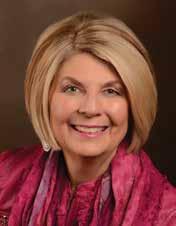
When you come home and step on the scales, you don’t want all the memories of that wonderful trip or meal to fade with the guilt and depression that often accompanies gaining weight or the scolding from your doctor because your cholesterol, blood sugar, or blood pressure are off the charts.
We often associate eating out as a special occasion, especially when on vacation. Since we’re indulging or splurging, we can carry over that same “special occasion” mentality to eating. I never feel like I’m denying myself anything. I use the same guidelines when traveling that I do when eating out anytime. Here are a few of my eating out healthy habits that might help you too.
1. The first healthy decision starts when they hand you the menu or you’re perusing the menu board. This is the restaurant’s marketing tool. Most restaurants don’t worry about feeding you healthy. They just want food to taste good, which often means extra butter, salt, and sugar, and for you to spend a lot of money. Knowing this, don’t be enticed to eat something you normally would avoid or can’t afford.
2. Don’t stop to read about any item with the description: fried, breaded, gravy, rich sauce, buttered, or containing any ingredient you typically wouldn’t eat. That eliminates about three-quarters of the menu items. Often meat or fish is offered on a salad entrée or as an addition for a cheaper price than as a main entrée.
3. I don’t eat red meat or carbs, so that usually reduces the menu to one or two choices. Then I choose between those based on what I feel like eating. Recently, we were out to lunch with friends after church and there was only one item on the entire menu I could eat and that was the salad bar where I could build my own salad.
4. Drink water! It’s free and you should always drink a lot of water, especially when traveling.
5. Choose half or small portions. Or split something with whomever you’re eating with, providing they’re choosing something you should eat. Stop eating when you’re full. If the portions are large, only eat half and ask for a to-go box to save for another meal. When traveling, there’s usually a refrigerator and microwave in your hotel room. Otherwise, let it go. Better to go to waste than waist!
6. Sometimes eating from the children’s menu is good for smaller portions, but beware – often it’s fried and breaded food like chicken nuggets and fries or grilled cheese, which might be bad for you even though it’s cheaper and a smaller portion.
7. Ask for any sauces or salad dressings on the side.
8. Restaurants usually give chips or French fries as a side with sandwiches. Ask for fresh fruit, a small salad, or sliced tomatoes instead. If they don’t substitute, then hold the fries or chips so you won’t be tempted to munch on them. With a main entrée, they will usually substitute extra veggies for the starch.
9. Avoid “value meals” that include fries and a drink. You don’t need the fries and water is free, so just order the sandwich/taco/burrito or salad by itself.
10. Choose flame-grilled, baked, broiled, or poached meat or fish. Pan-fried means lots of butter. Be sure to clarify if “grilled” is on a grate or on a grill. The grill is usually extra greasy and you wouldn’t want to know what they use for “grease” on those grills.
1. Breakfast can be a huge diet buster with all the fattening, high fat, high sodium choices. If you’re eating breakfast out, or it comes with the room, use the menu guidelines above.
2. I bring my own snacks. If you read my “Going Nuts” article in the July/August Christian Living Magazine, I wrote that my daughter once said, “My mother takes her nuts everywhere with her.” That’s a true statement. I always have a baggie of mixed nuts I’ve created from raw, organic, unsalted nuts. I mix walnuts, almonds, pistachios, cashews, sunflower seeds, macadamias, and whatever other nuts I have on hand. You’ll never find me on a trip without my homemade “trail mix.” Dried fruit without sodium sulfite can also be added to the nut mix, or eaten on its own. If you like protein bars, be sure and check label ingredients. Cheese sticks, jerky, carrots, celery, and fresh fruit are also good for snacking. Avoid chips and crackers.
3. If you’re staying for a while, stop by a local grocery store and purchase a flat of water and healthy snacks.
4. When starting out on a trip, I always pack a lunch for the first meal whether on a plane or by car. I usually make almond butter or peanut butter and sugar-free jelly sandwiches. They don’t need refrigeration and are a welcome break from airport food.
1. Walk.
2. Take the stairs instead of the elevator whenever possible.
3. Take a stroll around the restaurant before or after a meal.
Treat yourself to an occasional dessert or favorite food. The last night of a recent vacation, we ate at a restaurant with nothing on the menu that appealed to me. So, I enjoyed a chocolate, peanut butter milkshake and sweet potato fries for dinner, without guilt, because I’d been very careful the rest of the time!
Enjoy your eating out experience or vacation and take care of your body by eating well, using sunscreen, and fitting in some exercise!
Don’t you realize that your body is the temple of the Holy Spirit, who lives in you and was given to you by God? You do not belong to yourself, for God bought you with a high price. So you must honor God with your body. — 1 Corinthians 6:19-20 NLT n
Janet Thompson, award-winning Christian speaker, freelance author, and author of 20 books, is also the founder, director, and God’s servant of Woman to Woman Mentoring Ministry and About His Work Ministries. Her passion and focus is mentoring the next generation. Her tag line is, “Sharing Life Experiences and God’s Faithfulness.” She has a BS in Food Administration, MBA, and Master of Arts in Christian Leadership. Check out her books and sign up for her free weekly online blog and monthly newsletter at womantowomanmentoring.com. Join her on www.facebook.com/Janetthompson.authorspeaker, LinkedIn, Pinterest, X, and Instagram.
1 Tbsp. Original Ranch Salad Dressing Dry Mix (such as Hidden Valley brand)
1 Tbsp. red wine vinegar
2/3 cup fresh cilantro leaves chopped
2 Tbsp. roasted and salted pepitas (pumpkin seeds)
2 Tbsp. grated parmesan cheese
1/3 cup olive oil

In a blender or food processor, combine all ingredients except the olive oil. Process until well blended. Slowly add olive oil while blending and process until dressing is smooth. Add salt and pepper to taste, if needed. Refrigerate until well chilled. Serve over chilled greens and sprinkle with extra pepitas and crushed tortilla strips.











By Gary Moore
“If there is any one secret of success, it lies in the ability to get the other person’s point of view and see things from that person’s angle as well as from your own” (Henry Ford). “Rarely can a response make something better. What makes something better is connection” (Brene Brown). “Connect first, communicate later” (Bruce Muzik).
Back in 1990, Elizabeth Newton published the results of the doctoral research she did at Stanford University. In her study she assigned people to one of two roles: “tappers” or “listeners.” Tappers received a list of a couple dozen well-known songs. Then, after selecting one of the songs, their task was to tap out the rhythm to a listener by knocking on a table. The listener’s job was to decipher the rhythm being tapped and guess the song.

Over the course of Newton’s experiment, 120 songs were tapped out. Listeners guessed only 2.5 percent of the songs. That’s just 3 correct guesses out of 120!
However, the tappers predicted that their listeners would be right 50 percent of the time. In other words, tappers thought they were getting their message across one time in two. But, in fact, their message was getting across only 1 time in 40.
Why? Because when a tapper taps, she is hearing the song in her head. The tapping seems obvious to her. She can’t help but hear it as she taps, and she therefore believes the listener has a very good chance of deciphering her tune.
The listener, not knowing what the tune is, only hears a bunch of disconnected taps that resemble chicken pecks more than a musical number. But to the informed tapper, he comes off as dim-witted.
The same thing happens in relationships. When we “tap out” our message – whether it’s with our words, our inflection, or our body language – we believe it should be relatively obvious to the listener. But it’s not. Sometimes a seemingly evident message isn’t evident at all. It’s far from obvious if you’re not in the know.
That’s where understanding perspective, or empathy if you will, comes in. Understanding each other’s unique perspectives is not easy. But once you understand their perspective and hone your empathic skills, you will “tap” differently. What’s more, you’ll “listen” differently. In fact, when you harness the power of perspective and empathy in your relationships, you’ll enjoy connections that are deeper and better than ever.
Empathy means imagining what life is like at a moment in time for another person. It means putting yourself in their skin, looking at life through their eyes. It means walking in their shoes. And it’s a rarity. Psychologists Les and Leslie Parrott say that it is the single most important skill set for your relationships.
What most of us don’t understand is that there’s a secret to empathy: empathy calls for loving other people with both your head and heart, concurrently. Most of us do one or the other well; we either


feel someone’s pain with our hearts or we try to solve their problem with our heads. To do both can be tricky, but that’s the request of empathy. When you truly empathize with another person you are using both your analytical skills and your sympathetic skills – both your head and your heart. When we attempt to “love” others primarily with our heads, we are merely analyzing. And when we “love” with our hearts, we are merely sympathizing. Of course, there’s nothing wrong with either. But don’t mistake them for empathy.
Empathy requires a deep emotional connection (psychologists call it attunement) tempered by an objective cognitive capacity. That’s the key. It’s a tall order, no doubt. That’s why it’s built on the foundation of profound significance, unswerving authenticity, and deep connection.
Here are some of the things that empathy will do for your relationship: Empathy Curbs Criticism; Empathy Shortens Your Conflicts; Empathy Infuses Your Relationship with Grace.
Empathy is also fast-acting. Think about it. When you accurately see any situation from another’s point of view, when you can experience it like they do, you instantly take a different approach to it. You change – that very instant.
If you want to put empathy into practice, you’ve got to become a master at setting aside your personal agenda, if only momentarily. What’s your agenda? Well, it’s nothing more than your set of immediate goals – including what you want to do, what you want to feel, and what you want to talk about. The other person must become the only focus of your attention.
Let me close with a couple more quotations. First from S.I. Hayakawa, “It is only as we fully understand opinions and attitudes different from our own and reasons for them that we better understand our own place in the scheme of things.” And from that prolific writer Anonymous, “When empathy speaks up, it takes away stupidity’s microphone.” n
Gary Moore served as associate pastor at Cloverdale Church of God for 15 years. He does couples’ coaching and leads couples’ workshops and retreats called MUM’s the Word. He has a weekly radio program – Life Point Plus – on KBXL 94.1FM at 8:45 a.m. on Fridays. His website at www.mutualunderstanding. net has video teachings and other resources for couples. He may be contacted at glmoore113@gmail.com.

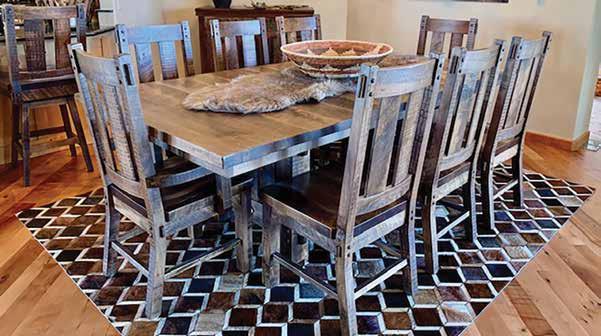










By Joan Endicott
“I can’t believe she’s really gone!” My body ached from weeping as I lay across her lavender, orchid-covered casket on that foggy, frigid February morning. I just couldn’t bear the thought of leaving her there. It was so cold. Like me, my sweet Penny hated being cold. It was just weeks earlier when we were in the ICU with her that I covered her with my heated vest to help her warm up so she could rest comfortably.
Even after her days in the ICU, we were lying on her bed in her bedroom, laughing hysterically about our college-day antics—which began 45 years prior when we met and instantly loved one another as soul-sisters—but the lasting joy those memories brought made them feel so very recent.

Like the time we wanted to get a pretty Coppertone tan for our upcoming double date to the Junior/Senior banquet, so we borrowed a tanning lamp. The directions said to put it six feet away for 15 minutes. Since we were in a hurry, we reasoned that if we put it three feet away for 30 minutes, it would work twice as fast! (Um, that’s a hard NO!) Painful, not pretty, second-degree burns later…sporting ice packs and healing salves on our faces for the next 72 hours…the date was almost canceled and would have been had we not been going with the best guys around. (I married my date!)
Or that fun sunny afternoon when Mark, Penny and I were goofing around after chapel, and we started talking like the characters from The Wizard of Oz—then began skipping down the sidewalk, arm-in-arm, singing “Follow The Yellow Brick Road.”
There was also the time with her parents at the Western Idaho State Fair when Penny and I discovered a llama that had a straw stuck in its throat. We just knew that if we could successfully demonstrate to Lucy Llama how to hawk that thing up, she could finally be free of it. Since that was before cell phones, there is no evidence of this, but hearing and seeing the hootin’ hollerin’ laughter, first from her parents and then others who were enjoying the show, it seems we could have been one of the featured attractions.
Then there’s the rodeo-gal Penny! If you haven’t seen a rodeo with Penny, you ain’t seen one, pardner! She had more “Yee haw’s” and “Let’r bucks” and sang more rodeo songs at the top of her lungs than any cowgirl West of the Mississippi! Getting to experience years of these and so many other best memories with her, Dave, and our kids—well, those are the most valuable treasures ever!
Such special memories give life to the past and present and serve as proof that the grief is so deep because the love was so strong. “How lucky (blessed) I am to have something that makes saying goodbye so hard.” —Winnie the Pooh
Though expecting the dreaded call, it hit like a tidal wave crashing against my soul when it did come. Disbelief—yet—not. I can’t believe she’s gone. My Penny’s gone? I don’t know this life without her. What happened, Lord? What could/should we have done/not done? We prayed—we hoped—we pleaded—we believed for miracles—even confident they were coming—certain we had seen some. For two and a half years, we expected God to touch her and heal her body completely from this illness.
We had hoped for so long…so much hope…until the moment the doctor asked us to step out into the hallway. “I’m sorry, but her body is shutting down. There’s nothing else that can be done for her. Now it’s a matter of making her as comfortable as possible.” No idea what he said after that. It didn’t matter. The rest was a blur. You know that out-of-body experience where shock sucks the oxygen right out of you like a vacuum?
Then even greater heartbreak: Watching my dear “brother” Dave, her grief-stricken beloved husband (Davey to her), share the doctor’s piercing words with his beloved bride—his heart crushing even more with the weight of those words. She, too, was shocked and later shared that she never thought she would actually die from this horrible disease of cancer that started in her breast.
So many months later, it feels surreal—a fog of disbelief at times. Other times, tears just start streaming down my face with no warning—just a hurting heart missing my soul-sister. That’s how grief is; it sneaks up and grabs you from behind and squeezes the air out, leaving you to wonder if or when you will ever fully catch your breath.
When you watch your loved one transition from this life to the next, it’s a gut-wrenching, bolt-oflightning reminder of the uncertainty and brevity of this life. In those moments, we are crystal clear about what matters and what doesn’t. Crisis creates clarity.
Grief is the heartbreak no one escapes. It’s a reminder of our mortality and a motivator to, as country artist Tim McGraw sings, “Live Like You Were Dying.” Living with an eternal perspective rather than a temporal one changes absolutely everything.
Though there are various parts to grief (denial, anger, bargaining, depression, and acceptance), they are not linear but rather like an out-of-control roller coaster. The grief journey is as unique as we are. There’s no right or wrong way to grieve. There’s no how-to manual. It’s a private, personal journey. Yet we Christians have the one thing that makes everything different—HOPE!
“He will wipe away every tear from our eyes, and death shall be no more, neither shall there be mourning, nor crying, nor pain anymore, for the former things have passed away” (Revelation 21:4). This verse offers hope beyond grief, envisioning a future without suffering.
Faith and grief co-exist. Christians grieve differently, yet we grieve deeply. Life has changed—but it’s not over. Jesus is the Way, the Truth, and the Life. Our hope is in our eternal home, not this temporal one.
Where I am now is looking at my precious Penny’s life and asking, “So what will I do with these memories, these examples, this clarity that life is 100% uncertain?” The days we have are unknown, but we get to choose what we do with each and every one of them. As long as you and I still have a pulse, we have a purpose! We get to see every day as a fresh, clean slate.
Lamentations 3:22-23 says, “The steadfast love of the Lord never ceases; his mercies never come to an end; they are new every morning; great is your faithfulness.” We get to choose right now to live with a renewed eternal perspective, on-purpose—by design, not by default.
Penny inspired me and everyone who knew her. How? By her loving example! Her priority was to live for Jesus every single day. So, what do we do with it all? Do we go into that black pit of grief and stay there? I did for months—still want to at times. I wish there was a more comforting answer to the question, How long will this take? other than, As long as it takes.
“Grief never ends…but it changes. It’s a passage, not a place to stay. Grief is not a sign of weakness, nor lack of faith…it is the price of love.” –Elizabeth I
Lessons from Penny’s Life Well-Lived:
• Live for and love Jesus—always in all ways
• Love others—let your actions prove it
• Listen well—make everyone feel important
• Laugh as much and as often as possible—laughter is contagious, and Penny’s was unmatched!
• Leap at the chance to make any time party time—celebrate every day as the gift from God that it is!
Penny was a beautiful example of being present, engaging with those around her while squeezing every possible ounce of joy out of each moment. She made everyone feel special, included, and loved. (She disliked using a phone, so was never tempted to be distracted by them.) Her life reflected Jesus’ love and she would tell you it was because the Joy of the Lord was her strength (Nehemiah 8:10).
I’m eternally grateful for my soul-sister Penny’s love, life, and legacy—may it inspire us all to live every day with an unwavering love for our Lord and Savior Jesus Christ, living on-purpose for His eternal purposes! And… getting to spend eternity together—how great is that? n
Grab your FREE copy of Joan Endicott’s “I Get To!”® book at www.JoanEndicott. com. Also, be one of the first to get her 2nd book, “I Get To!”® Own My Worth! Joan is an Award-Winning Keynote Speaker, Author and Coach whose coaching has reached over 30 countries. Find out more about her speaking and coaching here: www.JoanEndicott.com.

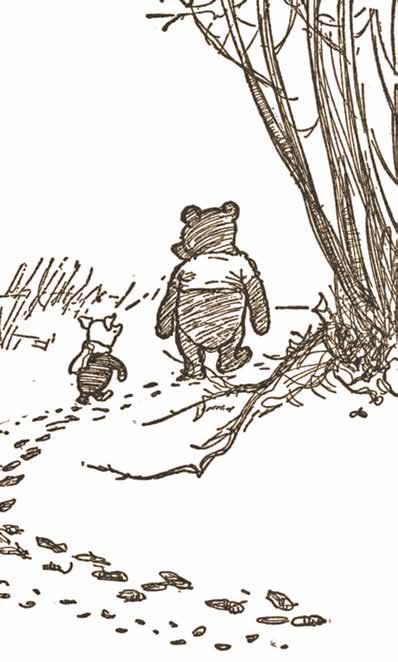
“How lucky I am to have something that makes saying goodbye so hard.”
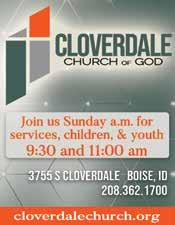


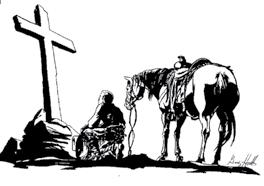

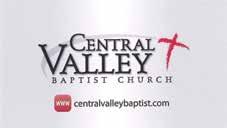

By Tom Claycomb III
Where’d the summer go? I don’t know, but it is going out with a bang. I’ve lamented before but it is hard writing a once every two months outdoor column if you live in Idaho due to so much going on here. On a summer Tuesday I took Philip Bowden crappie fishing, which was still smoking hot. In 3 to 3½ hrs. we kept 57 and threw back about 25. Then two days later I took off on a backpacking/flyfishing trip. Then a couple of weeks ago Katy and I picked huckleberries and the end of August archery elk/deer opened! There’s so much going on that I‘m going to write on two topics this issue.
If you’ve never backpacked, don’t be scared. You don’t have to hike in 20 miles. On your first trip just go in a mile or two. See which items don’t work and which items you forgot. I’d like to include a list of necessary items but that would be a whole page in and of itself. Come to one of my backpacking seminars.
Why backpack? Because you get into the backcountry where most people don’t go. There’ll be more fish and they’ll be bigger. But what if you only pack in four miles? Day hikers can still get there, right? Yes, but they’ll all take off three hours before dark to get out, which means that you’ll have the evening hatch to yourself.
You’ll have a sense of freedom backpacking. You’re by yourself and have to hustle to stay alive. You’ll be in the beautifulist (is that even a word, or is it beautifulest?) country that God ever made. I love getting back to camp at dusk, building a fire, cooking dinner and setting by the fire watching bats swoop around, eating mosquitos. Finally I get up and drag myself to the tent.
I don’t hardly ever keep trout, but there is something special about frying up a panful of little Brookies for dinner. I remember once Shawn Lee and I packed in on horses. He brought a guy named Xavier from Boston that never had been on a horse and never had flyfished. We rode in and slapped up camp and Xavier and I hit the river.
We caught a good mess and Xavier wanted to cook them for dinner; but when we got back to camp, Shawn already had dinner ready. Shawn said we’d build a rock ring in the river and eat them for breakfast. Xavier finally conceded. The next morning we ran down to the river only to discover that our fish were AWOL. We immediately thought Shawn was playing a prank on us but we finally figured that a rotten little river otter had stolen them. And at the end of the trip Xavier got thrown off his horse, so he can say he’s a genuine Idaho boy now.
I started bow hunting back in 1979 I guess. In Idaho you can archery deer hunt and if you don’t tag one then you can rifle hunt, but elk are only either/or. Bow hunting can be frustrating. Fred Bear summed it up when he said, “The chances of hitting a ¼-inch limb in front of a buck are directly proportional to how big his rack is.” I have more hard luck bow hunting stories than the law allows. BUT… there are a couple of benefits to bowhunting.
1. The weather is a lot milder than a lot of our rifle hunts have been. Think how many rifle hunts that you’ve gotten pounded by blizzards and frigid temps where your coffee pot freezes even though it’s in the tent.
2. The main reason you’ll want to archery hunt for elk though is that they’re bugling! There’s nothing like bugling in a bull within spitting distance. Even if you don’t tag one, if he comes in screaming his head off within mere yards, the whole week’s hunt was worth it. You’ll want to learn how to call. Get a few tapes and learn what sound to make in which situation. Don’t worry about sounding perfect. Multiple times I’ve called in a horrible sounding bull and thought it was some gunsel newbie on his first hunt, only to discover that it was a real bull. My buddies make fun of my calling but I don’t care – I get the elk called in despite their ragging on me.
Get out scouting to find a good spot to hunt and what their patterns are. Also, if you’re like me, I never have time to practice enough. So practice, practice, practice.
Well, we’re out of space. I’d encourage you to get out and enjoy God’s beautiful creation.
Christian Tip #5: I’d encourage you to try this. I’ve only started doing it this week but when I wake up and say my prayers, I ask God to use me that day. It’s worked twice this week. Tuesday, Philip and I passed a couple that had a blow-out. He couldn’t get his tire to let down but it had the same system that my old truck does so we were able to help him out. When we were leaving I said, “God bless.” That way he knew that it wasn’t because we were good ol’ guys and give us the credit. He’d know that it was because of God.
Then backpacking I had a weird deal happen. I’d parked at the trailhead and was loading up my pack. Two young ladies came up the trail that’d been flyfishing. We talked about fishing a few moments then suddenly one of the women said, “Oh no, my key is
gone. I set it on top of the back tire.” She looked all over to no avail. I crawled under the rig to see if it had fallen on the axle. I don’t have a clue why I said it, but I said, “Well, a pack rat might have gotten it.” We’d given up hope, but the thought hit me to walk over to the embankment behind us since I’d mentioned the pack rat. There was a pack rat hole and a key bob lying about 18 inches from the entrance. Wow! I told her I had experience with this since my wife is always losing her keys. I can’t name how many times we’ve prayed and then found them. The woman profusely thanked me, but I said, “Thank God.” That way she’d give the credit to God instead of me. You might try for 10 days asking God to use you and see if He does. He might even have you partner up with a pack rat to get Him glorified! n
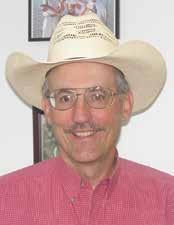




For more information about anything in this column, including equipment or gear, contact Tom at tomclaycomb3rd@gmail.com.
Bertel



clothes.”
1. ABIRAM (with Korah, Dathan and On; Numbers 16:1-3)


By Rosie Main
As the vibrant colors of fall paint the landscape, it’s the perfect time to embrace a natural, healthy lifestyle. The change in seasons brings a fresh perspective and opportunities to enhance our well-being. By focusing on a positive mindset, engaging in regular exercise, and nourishing our bodies with wholesome foods, we can enjoy the beauty of autumn while prioritizing our health. Let’s explore how we can make the most of this season and savor a delightful coconut milk latte infused with cinnamon, pumpkin, and turmeric.
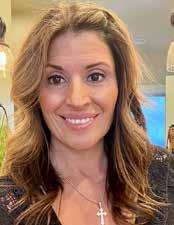
Devote yourselves to prayer, being watchful and thankful. –Colossians 4:2
A positive mindset is the cornerstone of a healthy lifestyle. As the days grow shorter and the air crisper, it’s essential to focus on gratitude and positivity. Take a few moments each day to reflect on the blessings in your life. Journaling about things you’re thankful for can boost your mood and set a positive tone for the day. Additionally, practicing mindfulness and meditation can help you stay centered and reduce stress. Embrace the beauty of the season, and let it inspire you to maintain a joyful and grateful heart.
Fall is a fantastic time to enjoy outdoor activities. The cooler temperatures make it comfortable to engage in exercises like hiking, biking, or simply taking brisk walks in nature. The changing leaves and scenic views provide a stunning backdrop for your workouts. Regular physical activity not only helps maintain a healthy weight but also boosts your immune system and improves mental health. Aim for at least 30 minutes of moderate exercise most days of the week. Remember, staying active doesn’t have to be strenuous; even activities like raking leaves or gardening can keep you moving.
Autumn offers a bounty of seasonal produce that is both nutritious and delicious. Incorporating these foods into your diet can enhance your health and well-being. Pumpkins, sweet potatoes, apples, and pears are just a few examples of nutrient-rich fall foods. These fruits and vegetables are packed with vitamins, minerals, and antioxidants that support overall health. Additionally, spices like cinnamon and turmeric add flavor and offer anti-inflammatory benefits. A balanced diet rich in whole foods will provide the energy you need to enjoy all the activities this season has to offer.




To celebrate the flavors of fall, here’s a warm and comforting coconut milk latte recipe infused with cinnamon, pumpkin, and turmeric. This delicious beverage is not only satisfying but also packed with health benefits.
1 cup coconut milk
1/4 cup pumpkin puree
1 tablespoon maple syrup or honey or stevia
1/2 teaspoon ground cinnamon and nutmeg
1/4 teaspoon ground turmeric
1/4 teaspoon ground ginger
1/2 teaspoon vanilla extract
A pinch of black pepper
A shot of espresso or 1/2 cup strong brewed coffee (optional)
Whipped coconut cream and a sprinkle of cinnamon for garnish
1. In a small saucepan, combine the coconut milk, pumpkin puree, maple syrup (or honey), cinnamon, turmeric, ginger, vanilla extract, and black pepper.
2. Heat the mixture over medium heat, whisking continuously until it’s well blended and heated through.
3. If you’re using espresso or coffee, pour it into your favorite mug.
4. Pour the spiced coconut milk mixture over the coffee.
5. Top with whipped coconut cream and a sprinkle of cinnamon for extra flavor.
6. Enjoy your warm and cozy spiced coconut milk latte!
As you savor this delightful latte, remember that a healthy lifestyle is about making choices that nourish your body, mind, and spirit. Embrace the season with gratitude, stay active, and enjoy the abundance of wholesome foods. This fall, let’s commit to living naturally and healthily, savoring every moment and every flavor the season brings. n
For further support with your health goals or more information, go to MainHealthSolutions.com.


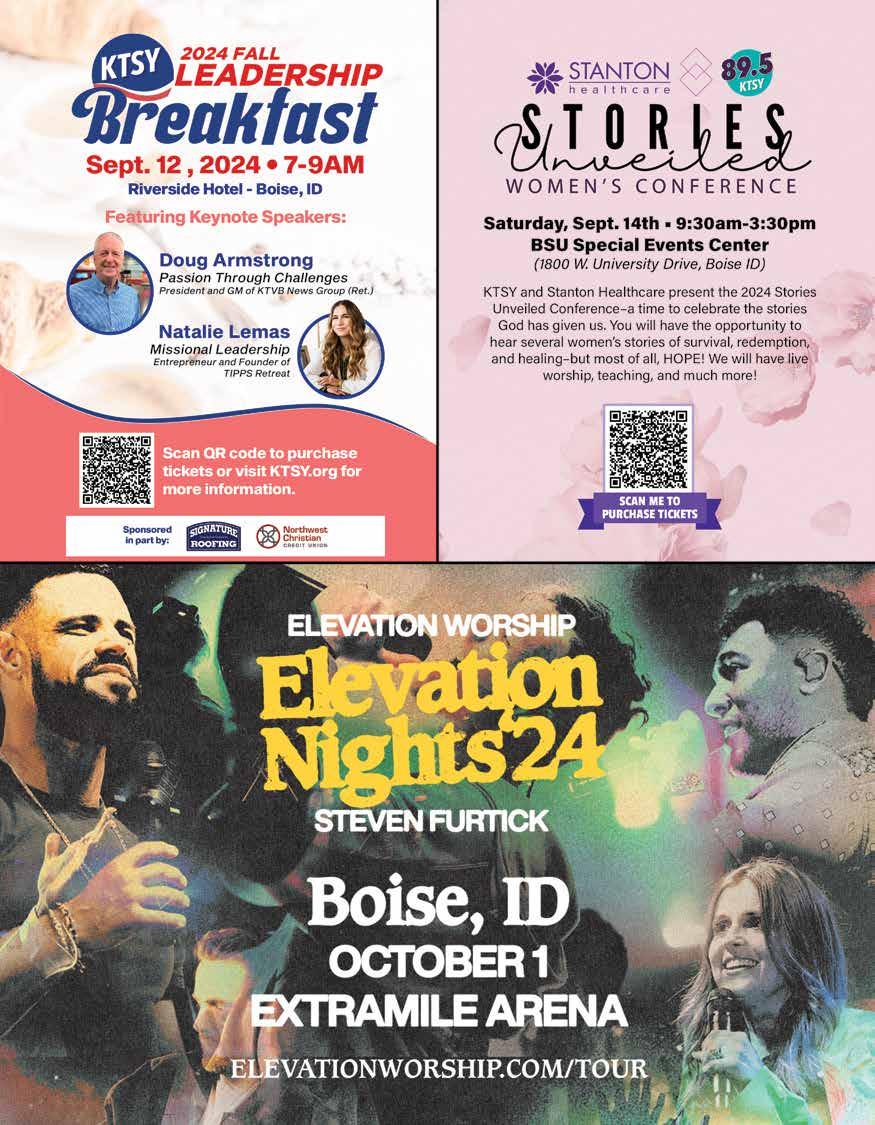
By Dr. Rick Chromey
I contemplate with sovereign reverence ... building a wall of separation between Church & State. – Thomas Jefferson, letter to Danbury Baptists (January 1, 1802) 1
The separation of church and state.
If you ask most Americans, they’d say the “separation” phrase was in the U.S. Constitution. And that Thomas Jefferson coined the concept, even wrote the Constitution. After all, one Supreme Court claimed Jefferson played a “leading role...drafting” the document. 2 Another Court named him “the architect of the First Amendment.” 3
But those assertions aren’t true...nor new. In an 1802 letter to a friend, Jefferson dealt with this early misrepresentation of his record:
“One passage...must be corrected... [that I] ... more than any other individual, planned and established... [the Constitution]. I was in Europe when the Constitution was planned and never saw it till after it was established.”
In reality, Jefferson’s influence on the Constitution was minimal, limited only to his suggestion for “provision for the freedom of religion,” and other rights to the document. 4
The First Amendment
On June 8, 1789, James Madison introduced the First Amendment to the Constitution. Regarding religion:
“Congress shall make no law respecting an establishment of religion, or prohibiting the free exercise thereof...”
There are two surprises in the First Amendment. First, the phrase “separation of church and state” is not present. In fact, only Jefferson and Madison spoke of that concept. Second, the limits are upon government, not religion. There is no Constitutional statement separating religion from government.
The Founding Fathers believed religion was a private matter between man and his God. Consequently, they desired to keep the Federal government out of religion. However, they also felt individual states should retain their rights to legislate religion and religious activity. Jefferson noted this distinction in his 1805 presidential inaugural address:
“In matters of religion, I have considered that its free exercise is placed by the Constitution independent of the powers of the General Government. I have therefore undertaken on no occasion to prescribe the religious exercises suited to it, but have left them as the Constitution found them, under the direction and discipline of the church or state authorities acknowledged by the several religious societies.” 5
In early America this distinction mattered, because every state recognized Christianity as its religion. Except for Catholic Maryland, all were Protestant. And most states were constitutionally bound to a denomination (i.e., Pennsylvania Quakers, Rhode Island Baptists, Virginia Episcopalians), even requiring state officials to pass a religious test.
For example Delaware demanded state officials to “profess faith in God the Father, and in Jesus Christ His Only Son, and in the Holy Ghost...[acknowledging] the Holy Scriptures of the Old and New Testament to be given by Divine Inspiration.” Pennsylvania, New Jersey, Georgia, North Carolina, New Hampshire and Connecticut required a “professing belief in any Protestant sect.” Virginia mandated governing officials confess the Anglican creed. Other states, like Massachusetts, legislated “the support and maintenance of public Protestant teachers of piety, religion and morality.”
Every state had “religious liberty” to denominate and legislate religion as they pleased. The Church wasn’t the problem, it was the State. So the Founding Fathers constituted the “united” states with a recognition of “free religious exercise” but also a protection that no nationalized Church would be “established.”
Separation of State from Church
But such religious freedom didn’t fully assure.
After all, any government capable to grant “freedom” could also remove or regulate it. And early America was populated by the descendants of religious dissidents who fled oppressive European state religions to colonize beneath their religious flag.
Jefferson hardly coined the “separation” phrase, but rather borrowed it from 16th century English clergymen, like Richard Hooker and John Greenwood. These church leaders first employed the phrase to confront the oppressive English monarchy who defiantly split from papal power to create its own Church (of England), then arrogantly ruled both institutions.
In the 1600s, a tyrannical persecution unleashed a great immigration to America. In some cases, entire churches moved (Pilgrims). Dissident colonial clergy – most notably Roger Williams (Rhode Island) – propagated the “separation of church and state” concept throughout New England. One 19th century writer recorded Williams so “distinctly...enunciated the doctrine of separation of Church and State,” that he not only carved Rhode Island’s constitution with it, but “our [American] political system” too. 6
One thing was clear. This “separation” kept the State out of the Church, not vice versa.7
After all, the Founders never envisioned a secular America. In fact, most warned against it.
[T]he Christian religion...must ever be regarded among us as the foundation of civil society. 8
(Daniel Webster)
There must be [Christian] religion. When that ligament is torn, society is disjointed and its members perish… the denunciation of ruin to every state that rejects the precepts of religion.
(Gouverneur Morris) 9
[T]he Christian religion… is the source, of all genuine freedom in government… no civil government of a republican form can exist and be durable in which the principles of Christianity have not a controlling influence.
(Benjamin Rush) 10
It’s within this context Thomas Jefferson authored a letter to concerned Baptist clergy from Danbury, Conn. (January 1, 1802). He assuaged their fears of a national denomination, then said religion was private and Congress’s power was limited.
To cement his argument, Jefferson employed the historic Roger Williams’ Baptist metaphor writing: “thus building a wall of separation between Church and State.” 11
Jefferson’s letter and “the phrase” satisfied the clerics...then laid dormant for decades.
For the next 150 years, every state operated constitutionally. State legislatures controlled the religious instruction of their public schools, expenditures (even funding religious works), and appeals for days of prayer and fasting. At the national level, Presidents ordered “fasting and prayer” days for Americans, spoke of their faith and prayed publicly. Churches (with steeple and bells)
centered every community, doubling as schools and community halls. Preachers served as teachers, mayors, governors and president (James Garfield).
None of these religious activities were considered unconstitutional. Americans – including presidents –commonly called America a “Christian nation.”
Until everything changed...in 1947.
(To be continued)
NEXT ISSUE: “The Separation of Church from State: How One Supreme Court Opinion Forever Changed America.” n
Dr. Rick Chromey is an historian, author and speaker who helps people interpret history, navigate culture, and explore faith. Since 2022, he’s worked as a Lewis and Clark historian for American Cruise Lines on the Columbia and Snake rivers. He is available to speak to churches, schools and organizations about topics related to history, apologetics, leadership and Christian education.
Christian Living readers may use the QR code to subscribe to Dr. Chromey’s inspirational (history, culture, faith) Morning MANNA! (M-F) email. www.mannasolutions.org
Sources:
1 “Faith and Freedom,” Monticello.org: https://www.monticello.org/the-art-of-citizenship/faith-and-freedom/
2 Everson vs. Board of Education, 330 U.S. 1, 13 (1947). https://supreme.justia.com/cases/federal/us/330/1/
3 Abington School District v. Schempp, 374 U.S. 203, 214, 234-235 (1963). https://supreme.justia.com/cases/federal/us/374/203/
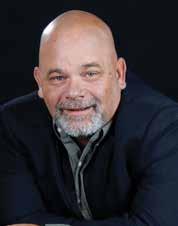
4 Thomas Jefferson, The Writings of Thomas Jefferson, ed. Andrew A. Lipscomb, vol. 10 (Washington, DC: Thomas Jefferson Memorial Association, 1904): 324-325.
5 James D. Richardson, “Second Inaugural Address,” A Compilation of the Messages and Papers of the Presidents, 1789-1897, Volume 1 (Washington, D.C.: Published by the Authority of Congress, 1899), 379-380.
6 Will C. Wood, Five Problems of State and Religion (Boston: Henry Hoyt, Publisher) 1877): 168. Downloadable at Google Books.
7 Will C. Wood: “The separation of Church and State does not mean the exclusion of God, righteousness, morality, from the State.” Ibid., 92.
8 Daniel Webster, Mr. Webster’s Speech in Defence of the Christian Ministry and in Favor of the Religious Instruction of the Young. Delivered in the Supreme Court of the United States, February 10, 1844, in the Case of Stephen Girard’s Will (Washington: Printed by Gales and Seaton, 1844), 41.
9 “An Inaugural Discourse Delivered Before the New York Historical Society by the Honorable Gouverneur Morris, (President,) 4th September 1816,” Collections of the New York Historical Society for the Year 1821 (New York: E. Bliss and E. White, 1821), 32, 34.
10 K. Alan Snyder, Defining Noah Webster: Mind and Morals in the Early Republic (New York: University Press of America, 1990), 253, Noah Webster to James Madison, October 16, 1829. 11 Jefferson: To the Danbury Baptist Association, 1 January 1802,” Founders Online, National Archives, https://founders.archives.gov/documents/Jefferson/01-36-02-0152-0006.






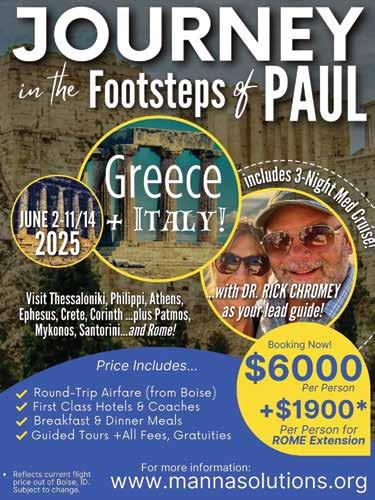
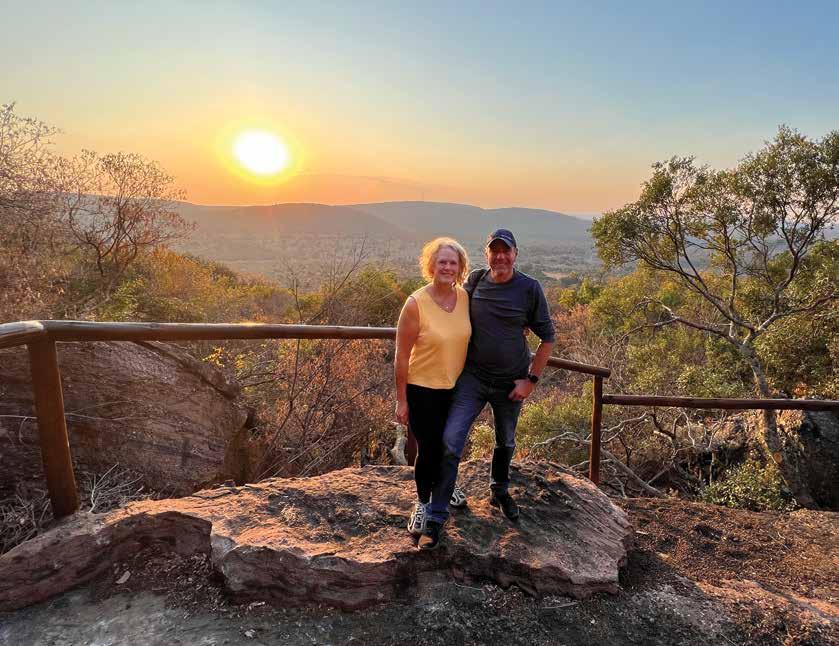
By Steve Bertel
Editor’s note: The subjects of this article, Tammy and Jan de Weerd, agreed to share their personal experiences and testimonies so that, when we face seemingly insurmountable challenges or crises in our own lives, we, too, can trust in the same unshakable faith they did – and know that God is already guiding our way through the difficult situations, even when we may not immediately see it. However, we are respecting the parents’ privacy wishes and not revealing their daughters’ real names.
Shadrach, Meshach, and Abednego knew they faced impossible odds when they defied the orders of the mighty and powerful King Nebuchadnezzar. But they also knew they served a God more mighty and more powerful than any earthly ruler.
Bound and cast into a fiery furnace – with the heat cranked up, on the angry King’s orders, seven times more than usual – the three men faithfully knew God was at their sides.
Even when they were surrounded by the blazing hot fire.
Even when it seemed there was no way out.
At least no way out they could immediately see.
Until, as we read in Daniel 3:25, Nebuchadnezzar peered into the furnace and, astonished, told his counselors, “Look! I see four men loose, walking in the midst of the fire; and they are not hurt –and the form of the fourth is like the Son of God!” The furnace was then opened and the three men were allowed to emerge. To the amazement of the King and all his men, they were totally unscathed!” In fact, Daniel 3:27 tells us… “the hair of their head[s] was not singed, nor were their garments affected, and the smell of fire was not on them.”
Such was the faith of former Meridian mayor Tammy de Weerd and her husband, Jan.
It started in the early morning hours of Monday, February 22, 2021, when they received a text from their youngest daughter, Taylor, who was living in Amsterdam at the time. The text said only: “Can you please call me in the morning? I have some news about Hanna.” Taylor knew the time difference between Amsterdam and Idaho; it was 8 a.m. in the Netherlands – and midnight in Idaho.
But Tammy couldn’t wait. She snatched up the phone and called her daughter.
And what Taylor told her was every parent’s worst nightmare. Hanna is Jan and Tammy’s oldest daughter. And she was in jail. On suspected drug possession charges. In a foreign country.
Hanna had chosen to travel to Egypt for her first working-abroad experience. For years, the U.S. State Department had warned American citizens “to consider the risks of travel to Egypt due to threats from terrorist and violent political opposition groups” (from https://eg.usembassy.gov/travel-warning-egypt-071917/). What’s more, Hanna would be an attractive, young American woman traveling alone. Knowing Hanna wanted to go there, Jan and Tammy had had the same reservations any parents would, but knew they could not talk their daughter out of going; Hanna had traveled to many foreign countries throughout her twenty some years – sometimes with her parents, sometimes alone. She was always cautious and careful when she traveled. She knew how to take care of herself. She was always aware of her surroundings. And had always stayed in touch with her parents along her solo journeys. So that gave Jan and Tammy at least a modicum of confidence.
Plus, they knew God would be the hedge of protection around their daughter during her travels. Tammy had come to know the Lord back when she was a teenager in high school; Jan had grown up in the Netherlands in a Protestant environment.
But still, they had concerns. Especially when Hanna told her parents she wanted to spend up to eighteen months in Egypt. “In school, Hanna always liked to differentiate herself from other students. She really liked to learn. She liked to explore. She wanted to live life to the fullest,” her mother says.
True to her word, Hanna had texted her parents as her flight was leaving Amsterdam, telling them she was “starting her journey.”
“We expected her to text us back in about eight hours, which would have been our Saturday morning, when her plane would have landed in Egypt. But the text never came,” Jan remembers. “Then, Saturday turned into Sunday morning, afternoon, and evening … and still no text. We kept checking our phones. But no text. No message. Nothing. Zero.”
Then came the midnight text from Taylor.
Hanna had aspirations of becoming a “digital nomad” of sorts; as a marketing specialist and web analyst, she could work virtually anywhere. In fact, she once told her father, “All I need is a web connection and I can work anywhere in the world.” During COVID, she had been recruited to do temporary work for a Treasure Valleybased health supplement company. As a result, she became a huge believer in “gut health” products, and later started her own company – to maintain her health routine.
Through the call, Jan and Tammy learned that Hanna had been detained by customs officers at an airport in Egypt, officials who were suspicious over the health supplements she was carrying: a large number of capsules (vitamins) and a bag of white powder, which was a healthy protein pancake mix.
While at the airport, Hanna had texted a friend: “They’re taking too long with the search. They’ve called more people over. Everyone’s looking at my bags, and I can’t even see what it is they’re looking at.” Later, she typed, “If you don’t hear from me in a day or two, tell my parents what happened.”
When the communications stopped after two days, the friend reached out to Taylor, who texted her mother.
Tammy says, “My first reaction was to give comfort and peace to our daughter. We could tell in her voice she was very anxious. She was carrying the weight of the world on her shoulders. So we gave
her the reassurance that we were now all on the same team; that Jan and I were going to do anything and everything we could to help. And that she didn’t have to carry the whole burden herself.
“My second reaction was to remind ourselves that God is in control. That we had to give the situation to Him. That He would take care of us and help us,” she adds.
At that point, the family did not have much information as to what exactly had happened to Hanna. “We didn’t know what ‘evidence’ the authorities had. Or why she had been detained. Nor did we know if she was hurt, had been violated, or … was even still alive,” Jan states.
Hanna had a former boyfriend who lived in Egypt. “Even though he and Hanna had gone their separate ways, he was there for us. 100 percent,” Jan says. Through the boyfriend, the de Weerds learned the only person who had had contact with their daughter was an attorney. (Taylor, Hanna’s two best friends, and the ex-boyfriend had pooled their finances – essentially, draining all their savings – to pay the man’s retainer.) But then the word came: he was an attorney who could maybe not be trusted.
Eventually, they learned more details. “We were told Hannah had been detained at the airport for about twelve hours. Then she was placed in a jail cell with many other women,” Jan recalls. And the conditions were deplorable. “She was held in a 12-feet-by-12-feet room with no daylight and just a single light bulb that burned 24/7. No blanket, no cot. Just a dirty concrete floor. With a faucet to get water and a hole in the corner where the women could use the bathroom.” In fact, the cell was so cramped at times “the women would have to take turns in order to lay down and sleep.”
The de Weerds also learned the authorities had taken Hanna’s herbal supplements to a forensic lab “to be tested.” A process, they were told, that could take more than 45 days.
So the next day, Jan and Tammy formulated a game plan. ‘Plan A’ was to get the lab analysis expedited and have it ready to present at Hanna’s court hearing that was scheduled for ten days later; ‘Plan B’ was to prove to officials the suspected drugs were only health supplements. The tricky part was: to do this all from the other side of the world.
There was stress, anxiousness, and the “not knowing.” And it was wearing on them. “We knew we had to do everything in our power, but I also knew I had to let it go and give it to God,” Tammy says.
As did Jan. “One day, I went out into our backyard to clear my head a bit. And as I did, everything sort of fell away. Everything was suddenly quiet. And I felt like God was telling me, ‘Give it to Me, Jan. Give it to Me. Trust Me. I am here. Let Me carry the load.’ When I came back into the house, I was elated; an incredible weight was lifted from my shoulders. I wanted to cry, I wanted to laugh, I wanted to sing!”
“I was sitting at the kitchen table at the time,” Tammy remembers. “And when Jan came back in, it was like he was a totally different person. It was a physical transformation. He had almost a bound in his step!”
Jan adds, “Once the dense fog and doubt had cleared from my mind, I was able to approach the situation with surprising clarity and peace. I didn’t have all the answers. Not even close. In fact, I knew nothing more than I had moments earlier. But what I did have was a renewed sense of direction.”
They knew the odds were against them. “Here in America, you’re innocent until proven guilty. In a country such as Egypt, you’re considered guilty until you can prove you’re innocent,” Jan explains.
So they pressed on.
Continued on page 23
By Ryan De Amicis
Let me start off by saying, “Matt, I’m sorry.”
At the beginning of the year, I prayerfully wrote down goals in seven areas of life. You know – new year, new me… Anyway, under a category I labeled “social,” I made a commitment to recording drum parts to one new song a month. My music producing friend – let’s call him Matt – was going to be the beneficiary of these said “drum parts.” Needless to say, this goal was left incomplete and my friend, Matt, picked up tennis.
Sometimes, I wonder if I am the only one who can make a goal and struggle with following through.
Thankfully, the research is comforting. In fact, according to the University of Scranton, 92% of people never achieve their New Year’s goals. Marcel Shwantes, an executive coach, writes on this topic and shares helpful pointers on how to set goals you are more likely to accomplish. In my humble opinion, the most crucial element he suggests is to align all of your goals. What does that mean? Your short-term goals – like creating drum parts monthly – if actually completed, should contribute to the success of what you want to accomplish long-term, like becoming Ringo Starr’s successor.
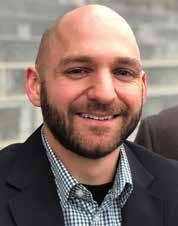
but a foolish man devours it (Proverbs 21:20). You betcha! I made some savings goals.
Invest biblically responsible. While the Parable of the Talents (Matthew 25:14-30) implies we should be productive with everything God has given us (including money), a law in Deuteronomy (23:18) and reason suggest the Lord cares about how we seek a return in the marketplace. Think of a company that works on a cure for a childhood disease while another company manufactures abortion drugs. Both can generate a profit, but by very different means. So, as an investment advisor, you know I nerded-out making goals around investing and how to do that in a way that seeks to glorify the Lord.
While I don’t know Mr. Schwantes’s relationship standing with the Lord, his insight echoes the timeless wisdom of Scripture communicated through Solomon: “Whoever walks in integrity walks securely (Proverbs 10:9a).”
Matt, what you are about to hear is not going to be encouraging. I don’t have a strong desire to become the next Buddy Rich. I have directed my efforts to other goals and, as a result, I have neglected our project. Please forgive me.
In the Christian world, we have a fun word for this idea: integrity. So, Marcel, if you don’t mind, I’d like to offer new wording for your consideration. Instead of aligning all your goals, let’s think about putting it this way: make your goals integral.
Integral means essential to completeness, according to old reliable Merriam-Webster. So, if we desire to have goals to work toward, and we’re sick and tired of poor follow through (I know I am), it could be wise for us to consider how integral our goals are.
As a Christ follower, my long-term goal is to be more like Jesus –or, at least, it should be. So, as I set goals around finances, I desire to heed the words of Scripture when it says to:
Give. It is more blessed to give than to receive (Acts 20:35b). So I walked into 2024 with goals around giving.
Eliminate debt. The borrower is slave to the lender (Proverbs 22:7b). I’ve also made goals around paying off my house. Save. Precious treasure and oil are in a wise man’s dwelling,
My hope is that Matt’s so busy improving his continental grip he doesn’t notice. n
Ryan De Amicis is an investment advisor with Christian Wealth Management in Boise, providing biblically responsible investment advice to Christians. For more information, visit investforthegloryofgod.com or contact him at ryan@christianwm.com or (408) 758-6413.
Investment advisory services provided by Creative Financial Designs, Inc., a Registered Investment Advisor. Securities are offered through CFD Investments, Inc., Member FINRA & SIPC. 2704 South Goyer Road, Kokomo, IN 46902, (795) 453-9600.
Christian Wealth Management, LLC is not affiliated with CFD Investments, Inc. or Creative Financial Designs, Inc., a Registered Investment Advisor.

They contacted the U.S. Embassy. But with COVID precautions in place, many Embassy staffers were working remotely. Eventually, through a friend of a friend, Jan and Tammy learned the Embassy “was aware an American woman had been detained.”
Through her prior position as Meridian’s longtime mayor, Tammy had established a number of professional relationships with highranking officials. So she started working the phones – calling, among others, the offices of Idaho Attorney General Lawrence Wasden and U.S. Senator Jim Risch, Chair of the Senate Foreign Relations Committee. “Idaho is all about helping people. So I’m incredibly grateful for our elected officials who were instrumental in helping us,” she points out. “God connected us with all the right people.”
Throughout the entire ordeal of countless phone calls, setbacks, seemingly insurmountable challenges, complications, frustrations, dead ends, red tape, and around-the-world, back-and-forth communications, Jan and Tammy always remembered Romans 8:28, “We know that, in everything, God works for the good of those who love Him. They are the people He called, because that was His plan.” Jan believes, “It was His guiding hand in all of this, guiding us through all the ups and downs and twists and turns.”
And, much like when Shadrach, Meshach, and Abednego were in the furnace and surrounded by fire, “Whenever anyone faces a crisis or is going through a trial, they need to have an open mind – and an open heart – to allow God to guide them, because He can move mountains,” Tammy advises. “Through all this, Jan and I really had to rely on our faith; we had to trust in the power of the Lord, perhaps more than ever before. It was all in God’s divine timing. Like a parent loves a child, God’s love for us is deep, relentless, and unconditional. We got through it – and Hanna is now safe, through the power of family … the power of community … and the power of faith.” n
(Editor’s note: The de Weerd family members have chronicled their experiences in the book, “When We Could Not See the Moon: Our Daughter Locked Away in a Foreign Jail.” Some quotes in this article have been excerpted from their book.)
Steve Bertel is a multi-award-winning professional radio, television, print media, and social media journalist, who retired after a 30-year broadcasting career. He and his wife of 42 years live in Meridian, Idaho. Steve can be reached at stevebertel65@gmail.com.
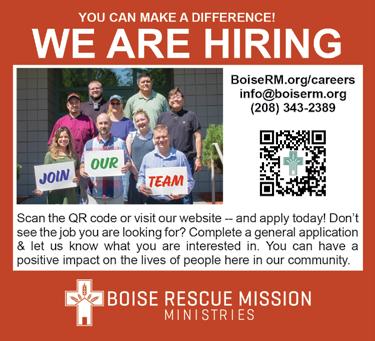




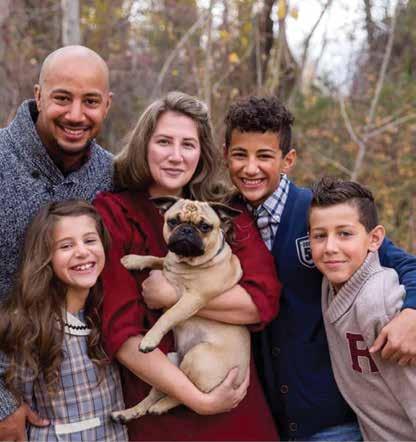
By Gaye Bunderson
Denae Warren’s primary job now is to draw people to downtown Caldwell, and especially to the Indian Creek Plaza. She and her team do it well. Last year, the site drew upwards of one million visitors. But there’s nothing in Warren’s past that would have made her seem destined for the success she’s known.
She started out on a rough road in life, adopted as a baby by parents who struggled with their own mental illness. Warren was sexually abused by a family member as a child, and her parents made no effort to intervene. “My adoptive parents were not healthy; they struggled with mental illness and did not understand their role as protectors,” she stated.
Because of the trauma and abuse brought on by her family, Warren did not go through one stage of health to another in any positive way. By the time she was in middle school, her home had become a war zone. Through a friend, her family heard about a children’s home in Idaho that could help. Located in Marsing, Hope House of-
fers a home for children between the ages of 10-18 (and those youth who turn 18 prior to or during their senior year in high school). The young people come to Hope House emotionally impaired, developmentally disabled, and/or from disrupted adoptions or dysfunctional families, such as Warren experienced.
Hope House serves children from throughout the U.S. and internationally, though mainly from the western states. “Children from other countries may be considered on a case-by-case basis,” according to a statement on the Hope House website at ahome2come2. com., which goes on to say, “Hope House provides a home for those young people who may have ‘fallen through the cracks’ of other governmental and/or private agencies.”
To provide a little history, Hope House was established in 1973 by Donna Lowry. Fast-forwarding to today, after 51 years Lowry is still a mainstay at Hope House. She has not retired to a rocking chair by any means. As a former child from a harsh beginning herself, now in her 80s she retains the title of administrator at the home.
When she launched the facility, she started out with 2-3 kids. But back to Warren, who came to the facility as a 15-year-old in 2000. There were around 70 kids at Hope House at that time.
Warren applied to Hope House and was accepted. Prior to coming here, she lived in Colorado Springs, Colo., and a friend and her mom drove Warren to Hope House in Idaho. There were no dramatic farewells when they arrived here.
“We sat in the car and talked briefly; then they put my belongings on the porch and drove away,” Warren said.
There had been violence in her past, but her arrival at Hope House gave her just what its name implies: hope – and a home where she was out of danger.
“Now I was safe; I felt both relief and fear,” Warren stated. Fear because she was all alone in a strange place, and relief because she was leaving the pain of a dysfunctional family behind. And even more relief flooded her when she started to get acquainted with staff and residents. “They were very welcoming,” she said.
There were people there who had been through experiences like hers, including trauma.
Lowry, as a mandatory (abuse) reporter, immediately believed Warren about the abuse she had experienced and turned in her abuser to the Rockford, Ill. Police Department to bring him to justice. “Donna and I went back to Illinois three times to testify and make sure he went to prison so he could not harm anyone else. Donna gave me a voice.” A voice that had for so long been silenced and ignored, even by people whose primary job it was to protect her.
Lowry behaved just the opposite of previous adults in her life.
“It was a joy helping to raise her,” Lowry said. “She was a normal teenager, but she had a listening ear and was willing to listen and learn.”
Warren graduated high school “with lots of girls who were like sisters to me” while living at Hope House.
Post high school, she sought higher education, and she received help from Lowry and the Sunrise Rotary Club. While Lowry kept a room for her at Hope House so she had a place to go during





holidays and summers, Rotary Club member Gary Multanen helped with other needs. “He paid for my books and kept me in school,” Warren explained. “He would check in and make sure I had everything I needed.”
She was attending Northwest Nazarene University, studying communication from 2002-2006. Her last year was completed mostly online; and following that, she continued to work for the Boys & Girls Club, which she started doing fresh out of high school.
Stated Lowry: “She showed her leadership in high school, and she stayed faithful while in college, and she invited us to her graduation and all the activities afterward.”
Eventually, Warren went to work for the City of Nampa, handling FEMA grants (Federal Emergency Management Agency). “That kicked off my career,” she said. “After I worked for the City of Nampa, I got my feet wet in grant writing. It opened a door into other nonprofits,” she stated.
Other places she worked include Genesis Community Health and Mercy Housing, one helping people find affordable health care and the other affordable housing. For over two years, she participated in Ride for Joy, helping to promote physical, cognitive, social, and emotional well-being through equine-assisted services to those who are challenged.
She also got married during this time; she and her husband have been married 17 years and have three kids.
Warren also serves on Hope House’s Board of Directors as of fall 2023.
“She’s a quality woman, a woman of courage, and a woman of faith,” Lowry said.
Warren joined Destination Caldwell two years ago as executive director. Its board of directors made the announcement on Decem-
ber 15, 2022. “Indian Creek Plaza is an attraction, and Destination Caldwell wants to promote it to tourists,” Warren said.
Familiar with downtown Caldwell’s history, Warren stated it used to be neglected and in need of revitalization. The area was dotted with old dilapidated buildings, and Indian Creek was used as a dumping ground. Caldwell’s then-mayor, Garret Nancolas, and other community members had a vision for the area that was set in motion while Nancolas was in office.
It took a full decade to complete the work, but downtown Caldwell has become one of the bright spots of the entire Treasure Valley, with its annual Christmas Winter Wonderland and other events.
Warren loves her job. Recalling the transformation of Indian Creek and its surrounding area from a forgotten area in need of repair to a place of beauty, she said, “I like an underdog story, and it likes me.”
Of her job, she stated, “We have an awesome staff and a great team. We partner with the City of Caldwell and neighborhood businesses.”
The newest project underway is a train-themed children’s playground for downtown. It is, in other words, a city for all people and of all ages. Everyone is welcome. Warren also expressed this opinion about the town: “Caldwell is a faith-filled community. We still have so much work to accomplish. We want to continue to develop downtown Caldwell and build a legacy.” n
For more information, go to www.destinationcaldwell.com.
Look for Denae’s Testimony on page 26

Editor’s note: Denae Warren, executive director of Destination Caldwell, was once a resident of Hope House in Marsing. Asked about her faith and whether she ‘met the Lord’ at Hope House or prior to that, and how she built up her faith in God over the years, she sent the following responses to a Q&A.
Q. Were you any sort of believer before you entered Hope House or were any of the people in your young life believers, even if poor ones?
A. I grew up in the church and always believed in God. Unfortunately, the home I grew up in was filled with hypocrisy, and religion was used to shame and silence abuse. Thankfully, I had some great youth leaders/mentors in my local church that represented well who Jesus is. Despite my traumatic upbringing, my mom had us in a good church.
Q. How old were you when you ‘came to the Lord,’ and can you describe the experience?
A. I was young when I came to the Lord but have had many seasons of rebellion in my life where I missed the mark and was not flourishing the way Christ intended. My faith became real to me when I was 17 at Hope House. I would read my Bible each night and pray out loud: my roommate thought I was talking to myself! I didn’t have a dramatic conversion experience; I think a lot of truth was [imprinted] into my heart from childhood, which was a good thing. Those are such formative years. Even though a lot of good got in, there were many lies that overshadowed it. I grew up with basic truth about who Christ is, but because trauma and lies were sowed at a young age, it has taken many years of counseling and Scripture to undo that suffering and separate from the [bad] dogma that kept me in shame.
Q. Were Donna Lowry (founder and administrator of Hope House) and Hope House itself pivotal in leading you to the Lord? And can you briefly share the story?
A. Hope House provides professional, Christian counseling on-site, which was pivotal for me. This is where I was believed, heard, and found my voice. Donna led devotionals with the teenage girls each evening and there is a church service on-site held Sunday mornings. We also had incredible staff who provided lots of conversations about faith and engaged with me on tough, theological questions. When you have a bunch of kids who have been through a lot of pain, they need answers. It wasn’t just one person who was instrumental in my faith journey; there were many and still are.
Scripture is full of allegory about light and truth. Family secrets need to be exposed and remedied for someone to heal. To be be-




lieved and for an adult to report on what I disclosed was pivotal in pointing me to Christ. Donna was responsible for reporting and was an advocate for me in so many ways. She taught me that God’s not into secrets. He’s the opposite. Luke 8:18 says, “We’re not keeping secrets, we’re telling them. We’re not hiding things; we’re bringing everything out into the open.”
Thankfully, I knew some basics about Jesus and never doubted the truth of Scripture in the big-picture way. Because of the abuse I endured, I never went from any phase of my life to another in a healthy way – I did not believe what the Bible was saying was true of me. I bought into lies about my self-worth and couldn’t see past that.
There is a great Scripture that my counselor at Hope House gave to me before I had to go before the court and give testimony of the childhood abuse I had endured. It comes from Luke 12:11-12: “When they drag you into their meeting places, or into police courts and before judges, don’t worry about defending yourselves, what you’ll say or how you’ll say it. The right words will be there. The Holy Spirit will give you the right words when the time comes.” I really clung to those words during the three years it took for my court case to be resolved. When you are a victim of sexual abuse, you have to tell your story in front of cameras so they can record you, in front of strangers, and in a courtroom full of people multiple times as a minor. It’s an ugly but necessary process.
Q. How is faith pivotal in your life and work today?
A. My faith is very pivotal because my outlook is not to see life in a circumstantial way but to see everything as providential. I get to be one of many on a team that stewards the Indian Creek Plaza: a once forgotten place that has been revitalized and now serves as the living room of Caldwell. Everything from uncovering the creek to creation of the plaza is a Cinderella story. The revitalization of downtown Caldwell is about righting old wrongs, seeing the potential of what could be. This was a grassroots community effort to bring back life into a forgotten place. This story really resonates with me; I love a good underdog story where there is restoration. In Indian Creek’s case, a literal natural resource had to be restored to reclaim the downtown area as a community asset. It took many years and many people to accomplish this feat, and we are proud to be a part of the legacy and to write the next chapter.
Downtown Caldwell, particularly during the winter season, is like walking on the set of a Hallmark movie. Our team loves being a part of beautiful, core family memories. Where else do you get to walk along a magical, once-hidden, icy creek and see over a million Christmas lights? n


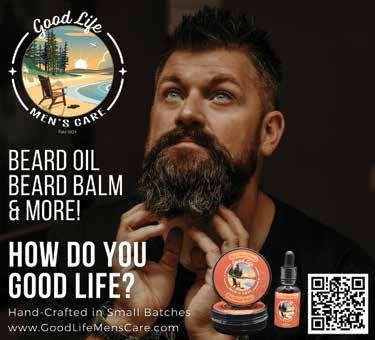
The Caldwell Fall Prayer Walk 2024 will be held on Saturday, October 12, at 3 p.m. and beginning at the Caldwell Memorial Park. Participants will walk around downtown Caldwell and stop to pray at various locations.
“We pray for the police, paramedics, firemen, the mayor and city council members, healthcare workers, our colleges and all schools, students, teachers, administrative staff, bus drivers, for a day care center for the homeless, for food insecure families, for human trafficking victims, for graffiti to go away, for the elimination of gangs, illegal drugs, and violence, for our young people to do well and for all of Caldwell’s businesses to do well,” walk organizer Arlene Robinett
said. “Also for more of God’s righteousness to come into Caldwell. We had a Christian concert at Indian Plaza which was well attended. We need more Christian concerts to take place downtown.”
This is a family event for people of all ages. Anyone who doesn’t want to walk may stay at the bandshell and pray. All are invited to come.
“We have a wonderful time of being together and praying for our wonderful city,” Robinett said.
A potluck dinner follows the walk and those who attend are invited to bring their favorite dish to share.
For more information, call Robinett at (208) 391-8516. n
Light the World Giving Machines are vending machines with a Christmas twist. They are placed in public spaces around the U.S. to allow people to donate to local and global nonprofit organizations that are committed to bettering the world, according to Karen Manthey, communication director for the sponsoring church.
This Christmas season, for the first time, Idaho is getting a Light the World Giving Machine for the Treasure Valley. People of all faiths and organizations may come visit a Light the World Giving Machine November 2 through December 31. The machines will be at The Grove in Boise from November 2 to December 2; in Caldwell
at Indian Creek Plaza from December 3 to December 13; and, finally, it will make a stop in Meridian at The Village from December 14 to December 31.
Said Manthey: “The machine will be supporting five local charities and two global charities. The five local charities are: the Boise Rescue Mission; the Idaho Youth Ranch; Glocal Boise; Genesis Community Health; and the Women and Children’s Alliance. One hundred percent of the proceeds from the machines go to the charities themselves.” n
For more information, contact Manthey at karenmanthey1@gmail.com.

By Roxanne Drury
Sabbath rest – what exactly is that? Do we as a people even know how to truly rest? Let’s explore what Sabbath rest means and then list ways to accomplish it in our busy lives.
Everyone I know has often expressed that their lives are too busy. There is simply too much to do and insufficient time to do it. This week was such a week for my husband and me. Oddly enough, since I retired, we have had many such weeks. Go figure!
Recently, I was reading the Book of Hebrews, NLT version, and came to chapter 4 and verse 9, which says, “So there is a special rest still waiting for the people of God.” The words “special rest” in this verse captured my attention. What kind of special rest does God have for us? The footnote read, “Or a Sabbath rest.” Okay, that made sense. I let that sit for a few days and returned to it this morning while writing this article. Have you ever read a verse that so intrigued or challenged you that you couldn’t let it go without further investigation? Hebrews 4:9 was such a verse for me. So, I did what I do in those instances and researched and read Hebrews 4:9 in other versions of the Bible that I have.
Side note: I have this thing about Bibles. My goal is to have one of every version. However, I don’t...yet!
Most versions read “Sabbath rest,” and some say merely “rest,” but the Good News Translation was much more precise. It reads, “As it is, however, there still remains for God’s people a rest like God’s resting on the seventh day.” Ah, now we are getting somewhere.
God commanded us to take a Sabbath rest as He rested on the seventh day after creating the world (Exodus 20:8). We must

remember that everything God does is for our good. The commandment instructs us to set aside a day to rest and worship. The commandments aren’t suggestions; they are commands. A Sabbath rest is meant for us to take a break from our regular daily routines and work habits and, well, rest. It is to our benefit to rest. What that rest looks like is up to you, but the word ‘holy’ indicates it should be treated as a unique set aside day. “The Sabbath was to be different than the other six days of the week.” 1
In Exodus 20:8-11, Moses clearly lays out God’s command. “Remember to observe the Sabbath day by keeping it holy” (NLT). He goes on to give further instructions, which I will paraphrase here: Work six days, the seventh day is a day of rest dedicated to the Lord; no one is to work, not you, your kids, your servants, your animals, or any visitors in your home. Verse 11 explains why. “For in six days, the Lord made the heavens, the earth, the sea, and everything in them; but on the seventh day He rested. That is why the Lord blessed the Sabbath day and set it apart as holy.”
While the commandment is given in the Old Testament, the New Testament also has something to say about the Sabbath. One Sabbath day, Jesus and his disciples walked through a grain field. The disciples broke off some grain to eat it. The Pharisees saw this and accused them of breaking the law of the Sabbath by harvesting (Mark 2:23-26). Mark 2:27 gives us Jesus’ response to the Pharisees: “The Sabbath was made to meet the needs of people, and not people to meet the requirements of the Sabbath.” As previously stated, everything God does or commands is for our good, to meet our needs, as verse 27 indicates. So, shouldn’t we honor that?












God knows what we need more than we do. Unfortunately, I have personal experience with workaholism. I am not proud of this by any stretch of the imagination. Working in the insurance industry in my younger years, I easily worked 12-hour (or more) days five days a week, brought work home for the weekend, and was 100% accessible on Saturday and Sunday. Practically speaking, this practice was not good for me and definitely not good for my family.
Not setting aside at least one day a week for rest and downtime made work more important than anything: my family, myself, and the Lord. Work became my idol. There is a commandment about that, too.
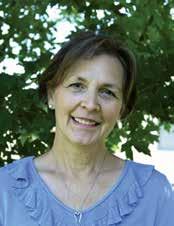
So, how do we, in this busy age, set aside a day of rest for ourselves and the Lord? I realize that in some jobs, a person is on call 24/7. It may not be possible to set aside a 24-hour block of time. Setting boundaries is even more critical in those kinds of industries. A day is 24 hours. A suggestion in this case might be to break up the 24 hours and allow yourself downtime a few hours each day. Do not check your email or text messages on the weekend or after a specific time each day. Give yourself permission to block out time to put your phone on Do Not Disturb or Out of the Office. Take a nap. A nap does wonders.
Setting boundaries for a Sabbath rest time is tricky if you are in ministry. Your work is serving the body of Christ, but the command is still valid. Ministry workers typically work on Sundays. So, choose



another day as your Sabbath day of rest. I feel certain God will honor whatever day you decide to set aside.
For those who work a 40-hour work week, stick to 40 hours. Save your evenings and weekends for family, personal time, and time for the Lord. Make those Sabbath rest days memorable and meaningful by planning game nights or family outings. My favorite would be a family reading night. Make one night a time for Bible study, whether personally or in a group.
In conclusion, following God’s example of resting is a spiritual step of obedience. Stepping away from your daily work and setting aside time for a Sabbath rest allows you time to be bathed in the peace of the Lord. It allows for rejuvenation and regeneration. It is sacred and holy. That ‘special rest’ is still waiting for you. My suggestion is – make it happen! n
Source: 1 https://thebiblesays.com/en/commentary/exo+20:8
Roxanne Drury is a wife, mother, grandmother, and retired Christian preschool teacher who served the Lord in children’s ministry for over 45 years. She has written a group study guide on Psalm 23, as well as other books. She may be reached at glorylandbooks@gmail.com.








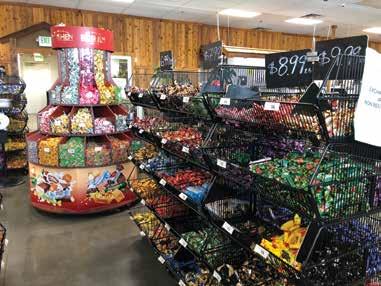




By Bethany Riehl
After a hot and smoky summer, we have officially arrived in the ‘Ber months. Although history indicates that it will remain hot and smoky for at least a few more weeks, all things cozy are right around the corner. Can you believe it?
I am both excited and hesitant to leave summer behind. It was a good one in the Riehl house. We didn’t do much in the way of activities; in fact, I don’t think we went to a swimming pool even once. There were adventures to be sure: camping, paddle boarding, a visit to see family in another state, and my first dip in Blue Heart Springs with some friends while the kids were at church camp. We ate our weight in watermelon, sweat profusely just going to the mailbox, and did our fair share of barbequing. I also, once again, tried and failed miserably, to garden.
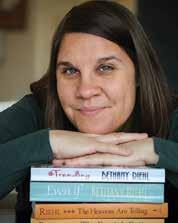
Mostly, I soaked in the days with my kids, wrought with nostalgia for summers gone by, appalled, as most parents are, by how fast it all went. I’m months away from having all teenagers in the house and I feel compelled to tell you, just in case you’re a young mom or dad that doesn’t yet know: you don’t have to be afraid of the teen years.
I’m going to tell you why I feel confident that you can set yourself up for a pleasant life when that season hits, but first I need to say that everyone is different, and of course this article will be chock-full of nuance. Our experiences are all distinct and there’s no perfect formula to raising kids. I have failed many times and in many ways, believe me. I’m not going to tell you how to raise your kids. But I do want to give you some tips to enjoy your kids, which is something that (if social media is an accurate source) isn’t all that common these days.
1. Take them with you as much as you can.
I love online grocery shopping, especially around the holidays. But when it first became a thing, they charged extra for it (remember that?). We were on a tight budget, so it wasn’t something I considered all that much. Years later, I’m actually grateful. The grocery store was my favorite “training” studio. There, my kids had to learn to walk with me, be patient, accept my answer when they asked if they could have candy, etc. If they caused a ruckus, we left and had a serious talk about it. For years, we would go to Hobby Lobby simply to look at things and learn how to behave in public. Same with the doctor, the dentist, the DMV...you get the idea. It’s a lot of work, but trust me, it’s worth the effort.
2. Apologize.
Letting them know when you’ve been convicted of sin you’ve committed against them (yelling, getting distracted, embarrassing them, etc.) and apologizing is such a wonderful model of what it’s like to walk with Jesus. Practice humility in such a way that they can see that you’re striving to be more like Christ. “Do nothing from selfish ambition or conceit, but in humility count others more significant than yourselves” (Philippians 2:3). In a culture that values self over all, animals over people, and freedom over children, it’s important that we get this right. But also, be careful to show them that their feelings don’t dictate truth. There have been times that I’ve had a child embarrassed by something I did and I’ve had to tell them that I will always do my best to respect them and not humiliate them, but that I cannot and will not tiptoe around their pride. As I give them grace, I expect grace in return.
3. Remember that God’s will for them is to obey you, and remind them, too.
There are numerous verses about children honoring their parents. As we teach them this, they are learning the practice of obeying God as adults. It’s our responsibility to care for them and this includes helping them to see that they are to “obey your parents in everything, for this pleases the Lord” (Colossians 3:20).
Of course, this also means we have the responsibility to be temperate and careful in what we call sin. I used to get irritated by sounds my kids would make – tapping, smacking food, silly noises, etc. Okay, if I’m being honest, I still tense up when my kids crack their knuckles. But, I realized one day that the way I was reacting to annoying noises was as if they were sinning, and of course they weren’t. My husband and I pulled back and tried to save discipline and correction for things we could support with Scripture.
4. Listen.
My oldest is an open book. She likes to tell me allllll the things. And, let’s be real, our conversations weren’t always that exciting. “Tell me more about Paw Patrol…”
But as she’s grown, I find her insight to be inspiring and encouraging. I love our late-night talks. My other kiddos are more quiet and need to be drawn out with outings alone where I need to either ask some questions to get them talking or be okay sitting in silence. Experience with the oldest tells me that the more I care about what they have to say, even about the little things, the more they’ll share the important stuff later on. One bonus to listening? They feel seen, cared for, and respected, and are more willing to listen to your advice knowing that it’s from love.
5. Be an open house.
I love to have people in my home. It’s not big or fancy. We are mostly an “ingredient” kitchen, so I don’t always have ready-made snacks* but I try to say, “Yes” to requests for friends to come over as much as I can. Last spring some kids began to gather in our backyard after youth group. They would bring guitars and sit around the firepit singing and talking. Trying not to crash the party, my husband and I sat in the living room – blinds open – so we were close, but not helicopter close. One night, I attempted to casually open a window because I wanted to hear the music, but Mr. Riehl told me I was being a creeper and stopped me. Unfortunately, the kids caught me and we just stared at each other through the window in awkward freeze-stares until they invited me to join them. So maybe it was fortunate? Anyway, I was able to sit and listen and laugh (seriously, teens are so funny!)…until I pulled out a nostalgic story and they all went silent and stared at me. I saw myself out.
My point is, though, my kids and their friends feel welcome here, and that’s golden in my book.
6. Serve when they’re young, and then serve alongside them I remember years ago, I was volunteering at VBS and had a bit of a m-o-m-e-n-t in my heart when I was checking kids in for moms that told me they were off to have coffee with friends. I wanted to be a drop-off and get coffee mom just once, but I seemed to be stuck on the volunteer list. Although my kids no longer attend VBS, I’m still on that list. But here’s the thing – my kids are on the list now, too, and they absolutely love it. And not just VBS, they serve Sundays and mid-week services as well and relish it. I know this is overwhelmingly an act of God’s goodness and grace, but He led us to model service for them, and they caught on. Recently I joked that I was finished serving mid-week, and our kids made it known that they would just go without me.
Please don’t take this as me saying that you need to serve in kids’ ministry. It’s not for everyone. But let them see you make church and serving the church, wherever that may be, a priority. It’s important, lasting work.
If you’re really struggling in your relationship with your kids, let me encourage you to pray and to not give up hope. We serve the God of all hope who is able to raise the dead to life. He can restore your relationships as well, no matter how old your kids are.
And lest you think I’m sitting here telling you how “accomplished” I am as a mother, can I share with you what I’m still working on?
I need to let my daughter who loves to cook, COOK, and not be so controlling.
I need to be in prayer much, much more for my children.
I need to be better at showing interests in their hobbies and helping them to have more access to ways to grow in them.
We need to watch less TV, and be in the Word together more.
I need more patience. Less reliance on myself and more on Him.
But in all these failures, I have this hope – I will never, ever be their Savior. They have a Father that is perfect in every way, and He is “gracious and merciful, slow to anger, and abounding in steadfast love” (Psalm 145:8).
So do I; and if you belong to Christ, so do you. So work hard, run the race, with and for your children, and know that Jesus has already transferred His righteousness to your account. Rest in that as you run, dear reader.
*One of my favorite quick snacks to make for kids is kettle corn. It comes together easily and is always a win. n
Bethany Riehl lives in the Treasure Valley with her husband, three kids, and one super chill dog. She writes articles and fictional novels when she can, and her one desire is to point others to the love and sufficiency of Jesus Christ.
¼ cup coconut oil
¼ cup sugar
½ cup popcorn
Heat the oil in a large pot (over medium heat) with 3 kernels of corn. When all three pop, it’s ready. Pour in the sugar and remaining kernels together and give a quick stir and place lid on the pot. Shake the pot vigorously up and down, side to side, until there are a few seconds between pops. Pour into bowl (careful! It hurts if any sugary kernels get on your arms), salt, and stir with a butter knife. Immediately place pot in sink and fill with water, to keep the sugar from sticking.


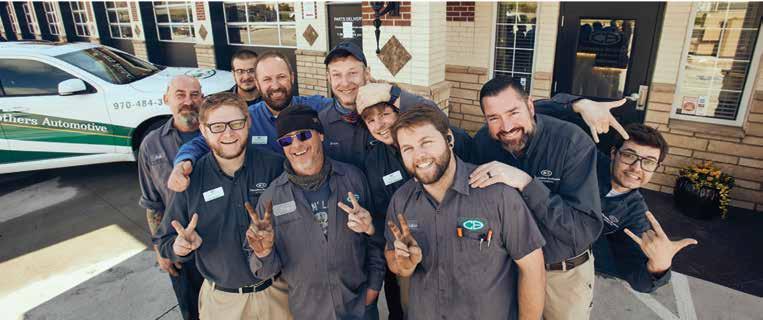
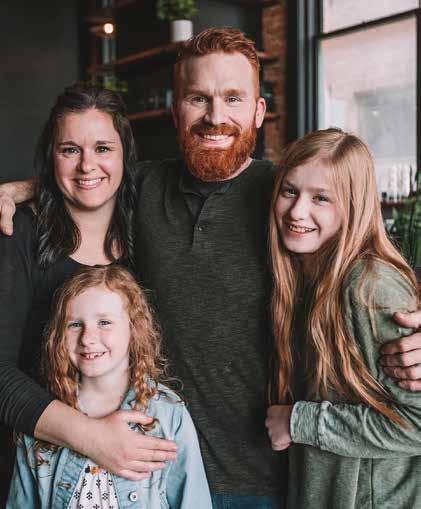

By Gaye Bunderson
A coffee shop in Caldwell boasts the unique name of Bond and Bevel Mercantile and Coffeehouse – and the name isn’t the only unique thing about it. Launched in April of 2022 by Heath and Krista Albers, the shop blends coffee, conversation, and community all in one.
Many coffee houses may offer that, but Bond and Bevel’s uniqueness lies in the fact that its owners are believers who not only welcome everyone into their shop at 107 S. 7th Ave. in Caldwell, they also host worship nights each first Friday of the month onsite, with everyone welcomed at that event as well.
Along with coffee and treats, Bond and Bevel sells uncommon wares, including handmade quality leather work and outdoor gear highlighted along the walls of the shop. The Albers are creatives, and much of what is on display now are pandemic-era projects that kept the couple busy. “Once the world stopped turning in the spring of 2020, we had nothing but time on our hands. So we started sewing and drawing. Maybe we’ve always been artists and that part of us was just dormant, but tapping into this new craft woke us up. Since we had the time, we just went all out,” Krista Albers wrote at www.bondandbevel.com.
Many of the outcomes of their creative labors can be seen in the shop today.
Though Bond and Bevel is located in Caldwell, the Albers are originally from Albany, Ore. But that part of the Northwest started to feel alien to them, according to Krista. A “new normal” that overcame Portland and other parts of the state in the past decade bothered the Albers. In Krista’s words, “Portland is increasingly unleashed.”
She continued, “We didn’t like the direction [parts of] Oregon are going, in its political climate and family values.”
They still loved the Northwest area of the U.S. “We’re Northwest born and bred. I love the climate, the beauty. We’re drawn to the beauty of the Northwest states,” Krista said. They were familiar with the Gem State, and it presented pluses to them, especially one big plus: Idaho in general aligned more closely with their values and their faith.
When they started to think about moving to Idaho, they first thought of Coeur d’Alene. “God said ‘wait’,” Krista said. And they did. Also, there was nothing in the middle part of Idaho that they liked, so that was out.
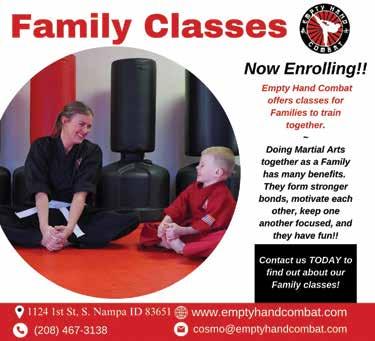
Krista explained, “We looked at the Boise area, and I visited here. … We were drawn to Caldwell, with its blue collar roots. It was up and coming, and we wanted to be part of the rebranding of Caldwell. We wanted to help bring Caldwell recognition on all levels.” They’ve accomplished a measure of that in two years. Their coffee shop and mercantile store was featured in “Entrepreneur Magazine,” a national publication. “We’re bringing an impact and recognition to the community,” Krista stated.
She also said, “Canyon County in general is fantastic. They’re very small business friendly here. Idaho is doing things better too, in terms of policies and politics – things that help us preserve our own priorities.”
Along with rare goods and craft coffees, another out-of-the ordinary twist to the business is its first Friday of the month 7:30 p.m. worship program.
Their inaugural Friday worship was in 2023, and the event is growing. They’ve had 5080 people on occasion, according to Krista. “We’ve had people standing on the sidewalks with their hands raised,” she said. They feature different entertainers every month, and they don’t celebrate any one church. They’re ecumenical and have welcomed Lutherans, Presbyterians, Catholics, and other denominations.
But what about non-believers? According to Krista, they’re neither left out of the coffee shop community or the worship events. “We’ve had non-believers who know and trust us and who wouldn’t necessarily go to church but have come to our Friday programs.”
She stressed, “We don’t do anything weird and no one at the event does anything weird. God’s not weird, but there are believers who are weird in Jesus’ name. They’re representing themselves, not Him.”
At each Friday program, there is an established leader, prayer, and moments for someone to share a word from God. “It’s a prayer meeting; there are no scripts, but there’s lots of worship.”
In the coffee shop, there is a community even between believers and non-believers, Krista said. “We’re having conversations, sharing the gospel across the counter. As divine opportunities arise, we try to take advantage of them – and there’s ample opportunity.
“People who aren’t believers come here every day. They may even consider themselves atheists. But they come because of the customer service, the product, the kindness of our staff – they’re people who know what we stand for, and they still come in because of the atmosphere. As His followers, we are emitting the love of Jesus.”
There are items all over that denote the shop as Christian, like Romans 1:16 in small letters on the coffee cups, or the stickers here and there with Scriptures.
“The goal is to shine our light. We have a responsibility as followers of Christ to share the truth with those who don’t yet have it. All our workers are Christian, and we have the responsibility to share the truth and create a community for Christians as well.
“Our agenda is to be a light, a city on a hill; it’s to foster community for those who are currently following Jesus, and hopefully they can all feel Jesus here, His presence. It’s a safe haven, a refuge. That’s something that people have mentioned to us, that it’s a safe place where you can feel God’s presence.”
Krista became a Christian in college, while Heath was exposed to the faith as a younger person living at home. They met at Oregon State University in Corvallis; he was majoring in speech communication, and she was majoring in early childhood education. He’s now 44, and she’s 43. The couple has two daughters: Moriah, 15, and Eden, 10. The entire family loves it here, and their goal for themselves and the shop is to be permanent residents.
The name Bond and Bevel was selected in honor of Heath’s creative skills.
Said his wife: “Heath is very good at a lot of things – he made a robotic arm in the fifth grade in the ‘80s. He doesn’t come off as prideful; he doesn’t blow his own horn – I blow his horn for him. We wrote down a couple dozen words that encompassed all the words associated with Heath’s skills and settled on Bond and Bevel.”
Things are not perfect for the entrepreneurs, as they aren’t for other business owners. “All sales in the valley are down about 20%,” Krista said, confessing she said to the Lord, “‘If You want us to continue to be the light of God, You have to help us keep the lights on.’
“I remember when we were talking about the transition of moving here, we didn’t want a sleepy retail shop. We wanted a place where community happened.”
She said the coffee and the leather goods complement each other. “If people come in for coffee, it creates the consistency of seeing high-quality, handmade items, such as a bag. But if they come in to look at the bag, they may try the coffee. They work together; they benefit each other.”
No one in the family seems to miss the “new normal” of their former state. Moriah, who is very intuitive and loves Jesus, told her mom, “It just feels lighter here. It’s not heavy; there’s a lightness.” n


Moore’s
stand Method® is a straightfor ward, common sense approach that weaves scr ipture & psychological research toget her. September 13th

a bles sing. We learned some great things - how to communicate in a healthier way; respecting each other ’s per spective s, and making sure we are set ting the tone of the conver sation for success. -Jessica & Colin
By Larry Banta
I noticed I was having trouble seeing when I was about 12 years old. I was an avid reader but words were not clear. My eye doctor did not seem to be able to provide me clear vision so I used reading glasses from that very young age. In medical school, my best friend, Andrew, told me his dad was an ophthalmologist and was really good at correcting vision. I went home with Andrew on a holiday for his dad to do an exam. He gave me a new prescription. When I collected the new glasses, I was surprised at what I was missing. Now I could see in 3D when it was rather flat before.
The Bible talks a good bit about spiri tual vision. How is your spiritual vision? Are you 20/20? Is there blurring, distortion? Not really seeing what God is doing? It seems most of us are not seeing well at least some of the time. Maybe it is time for a spiritual vision checkup.
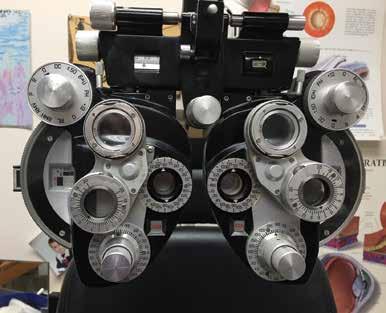
The soon to be Apostle Paul, first known as Saul, was on the road to Damascus, Syria. He was certain that serving God meant eradicating the world of those pesky followers of The Way. Saul dedicated himself to seeking out the believers and persecuting them. He was even involved in murdering them. He was sure that his vision was good, that he was doing the right thing.
We read about this in Acts 9. Suddenly, he was confronted by a blinding light and the voice of Jesus: “Saul, Saul, why do you persecute me? (Acts 9:4b)”
He was blinded and had to be led to the next city to await further instructions. He was soon met by a local disciple. Acts 9:17-19 reads: Then Ananias went to the house and entered it. Placing his hands on Saul, he said, “Brother Saul, the Lord – Jesus, who appeared to you on the road as you were coming here – has sent me so that you may see again and be filled with the Holy Spirit.”

“Our Guns Are More Fun”
Immediately, something like scales fell from Saul’s eyes, and he could see again. He got up and was baptized, and after taking some food, he regained his strength.”
Scales fell from his eyes and he could really see. Now what he thought was his job, persecuting the Christians, was all wrong. He could see that God had called him to not be a persecutor but a follower of Jesus. During my years in college, I was an avid true believer…in evolution, atheism, or at least agnosticism. Do your best and maybe after death, eternity would be okay for you, if there was maybe something after death. That was my spiritual vision. My mother finally convinced me to attend church. She had recently accepted Christ at a Billy Graham Crusade. I heard the music was good so I decided to go. The preacher spoke right to my heart. I was convicted of sin. I came to Jesus that night and was baptized. It was a New Year’s Eve service so I really never knew if it was 1973 or 1974. I was amazed at the change in my heart.
Suddenly my vision was clear. I could see the world very differently. Returning to my mother’s house after the service, maybe 3 a.m. or so, I pulled out my textbooks I brought home with me and opened a Bible. It all made sense. God’s Word was real and true. The textbooks were not. Wow! I can see! Amazing! I see the beauty of life, of Creation, and also see the terrible corruption of the world through our sin. My blindness was severe, but my new vision was quite revealing. Scales had truly fallen off my eyes.
The scales come off when we first believe, but as we live in this corrupt world, our vision becomes clouded, blurry. It becomes hard to see what we need to see. I enjoy seeing clearly and knowing what I am looking at. We need something to correct our spiritual vision so we can truly see. What is 20/20 spiritual vision like?










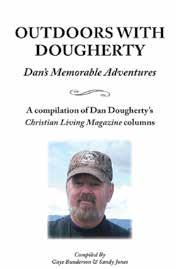
This tribute to our friend & colleague is a compilation of all his articles; Dan’s personal photos & art, even some that were never published. You’ll thoroughly enjoy this walk down memory lane. Order Your Copy Today
We have 20/20 spiritual vision when:
• We can truly see the awesomeness of God our creator.
• We can look around and see His amazing creation.
• We can truly see our humble state before Almighty God.
• We can see, and accept with gratitude, the wonderful gifts He has given us, our talents, our family, our work, our many blessings.
• We can see the desperateness of the broken world around us.
• We can see His will in our lives, our role in the family, the church, the community.
• We can see our part in responding to those around us in need of a Savior, in need of comfort, of counsel, of mentoring, of a godly example.
• We allow our vision to be so clear that our hearts break with what breaks God’s heart.

How do we get there? What is the treatment for spiritual blindness? Our first step is just like with the blind man that Jesus healed in Mark 10:50-52. And Jesus said to him, “What do you want me to do for you?” And the blind man said to him, “Rabbi, let me recover my sight.” And Jesus said to him, “Go your way; your faith has made you well.” And immediately he recovered his sight and followed him on the way.
We confess our blindness and ask for healing, for Jesus to come into our lives, that we may see. We ask Him to open our eyes. Open my eyes, that I may behold wondrous things out of your law (Psalm 119:18).
We then check to see if there are things in our lives affecting our vision.
I will not set before my eyes anything that is worthless. I hate the work of those who fall away; it shall not cling to me (Psalm 101:3).
Sin in our lives pulls us away from God, makes our vision blurry, distorted.
Come near to God and he will come near to you. Wash your hands, you sinners, and purify your hearts, you double-minded (James 4:8).
Jesus says he has a salve to heal our spiritual eyes so we can see clearly.
I counsel you to buy from me gold refined in the fire, so you can become rich; and white clothes to wear, so you can cover your shameful nakedness; and salve to put on your eyes, so you can see (Revelation 3:18).
The salve could be considered the blood of Jesus. As we draw close to God, confess our sins, seek His help, He cleanses us from sins and that allows the Holy Spirit to keep our vision clear. Then we can stay focused, run the race and finish strong by fixing our eyes on Him.
Having a good prescription to see clearly can make a big difference in our lives. n
Dr. Larry Banta is an author of several books, a retired psychiatrist, and a former missionary. He served in India, Mexico and Kenya. He and his wife, Evelyn, a counselor, travel together to provide consultation and training in various international locations.


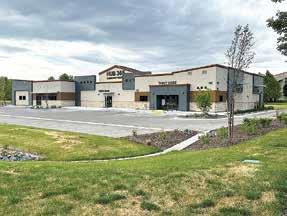
365 is an all volunteer ser vice organization. Procee ds from our sales will fund various programs for the community.

10/6 & 20: Plant Based Paradise - A Guide to Healthy Cooking & Eating 1PM to 3PM 10/22: Red Cross Blood Draw 9AM to 3PM for an appointment please visit redcrossblood.org Celebrating Life Through the Arts, art classes: Thursdays at 6PM
& Vision Clinic 7AM to 7PM HUB Community Center
By Megan Hill
Harrison Wise was 7 years old when he picked up a book called “A Long Walk to Water” by Linda Sue Park. This was not the typical novel found in the backpack of a second grader. “A Long Walk to Water” is based on the true story of Salva Dut, “Lost Boy” from Sudan who fled his war-torn country as a child. The book intertwines Salva’s journey in 1985 with the story of Nya, a little girl who struggles to find the clean water she needs to survive. With the guidance of his mom, Janelle, Harrison dove into the story, and compassion grew in his heart for those around the world without access to clean water.
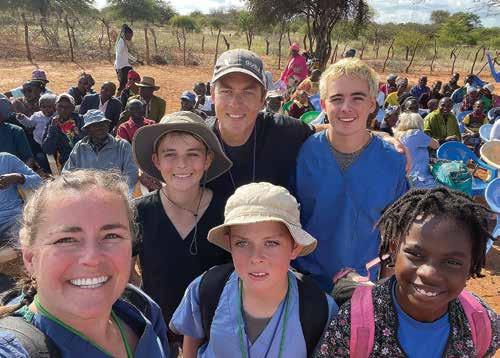
Harrison told his mom that he wanted to do something about the lack of water for people like Salva Dut, and when asked what he planned to do, he simply replied, “I know how to make muffins.” And so, the Boise family of six began planning their first muffin sale. Janelle baked around the clock, neighbors lent their muffin tins and mixing bowls, and the four Wise children took shifts after school selling muffins in the front yard of their East End home.
The family could not have predicted that their first sale would generate over $9,000, or that it would become an annual tradition. Now 15, Harrison and his family have been holding the muffin sale on a yearly basis, donating the proceeds to a water project chosen by the family.
In 2020, Janelle heard about a local nonprofit called Expansion International through a close friend named Lori. Lori shared with Janelle that she and her family had recently spent two weeks on a mission trip with Expansion International in Kenya. During their journey, they volunteered in medical clinics and put on children’s ministry programs in under-resourced areas. Lori also shared that Expansion International was currently working on a clean water project for a rural village. She and her family had an unforgettable experience, and her story inspired Janelle and her family to do some research on the organization.
The Wise family learned that Expansion International had been operating in Boise since 2008, with a goal to partner with communities to transform individuals out of poverty through the love of Jesus Christ. The organization starts by finding leaders, partners and volunteers in Kenya, then organizes sustainable development projects. Their primary focus areas are education, healthcare, and economic empowerment, with the overarching purpose to share the love of Jesus with everyone they serve.
Local leadership is essential to lasting change, which is why Expansion International Africa implements all of the programs and initiatives year-round. At the time of first connection with the Wise family, Expansion International was in the middle of a campaign called Dig Deep, and their goal was to raise money for a clean water
system for two small villages near a town called Bahati. Bahati sits just north of Nairobi and is home to about 3,800 people.
Several years prior, Expansion International helped advocate for a group of internally displaced people who had been surviving in a refugee camp in the forest. Expansion staff from Boise and Kenya worked together to advocate for the refugee families and, after years of effort, received funding from the Kenyan government to relocate the families. Nearly 2,000 people were resettled in Bahati. In the following years, Expansion International and donors from the Treasure Valley raised money to build brick houses, begin farms, and establish a small medical clinic.
While Bahati was growing into a stable and healthy community, there were serious challenges with its water supply. The water nearby was extremely high in silt, which caused excessive algae growth and was dangerous to human health. It could not be easily filtered, and the sediment was so high that it killed crops. The Wise family talked it over and came to a decision; they would partner with Expansion International for their 2020 muffin sale. Fifty-two hours of selling muffins later, they raised over $11,000 and were able to help complete the Bahati Water Center. As a result, a 100,000-liter tank was installed with a filtration system, and new pipes were laid to bring water to the community.
The treatment system eliminated the silt contamination and made the water safe for drinking and watering crops and livestock. Soon, the Wise family received reports and photos from Expansion International showing how the money had been put to work, inspiring them to fundraise for another community in need. In 2022, the family chose to bless a community called Kasten. Unlike Bahati, Kasten was in a dry, arid region with little rainfall and even less hope. This time, the bake sale raised more than $15,000 for a clean water system.
In 2023, the family of six made arrangements to join a two-week mission trip with Expansion International to see the needs and the impact in both communities that they had helped. “That’s the first time we’ve ever seen a project that we’ve raised money for, and it actually brought about huge anxiety because we saw the desperation and the need for it... It was hard seeing the people in pain. We took a lot more personal responsibility in wanting to help,” said Janelle.
“This was the first water project we did that we got to see in real life. We stayed in Bahati first, and it was cool to see what all the money had done to give people access to clean water,” said Elliot, 17.
Janelle described witnessing the contrast between the two communities as ‘sobering’. After years of advocacy and hard work, there is now clean water, access to medical attention, a stable food supply, and a student sponsorship program in Bahati. In contrast, Kasten
is in the beginning stages of its partnership with Expansion. “You could tell Bahati was many years beyond the desperation point, and Kasten was still in great need on multiple levels, and that was hard. I think that one of the biggest things we learned was the longevity of relationships that we saw in Bahati and what is possible for Kasten with the support of E.I.,” said Janelle. “Bahati felt full of joy, because there was stable water, stable food, stable medicine, a lot more people and kids going to school, people (with) fulfilling jobs, like a really functioning community,” said Janelle. “But in Kasten the situation felt desperate.”
The Wise family got to do much more than tour the two communities during their trip to Kenya. Cosette, 11, welcomed patients at a medical clinic and held young children while their mothers were seen. Tyson and Elliot conducted vision screenings and distributed reading glasses.
“Working with the people was really enjoyable and joyful,” said Tyson. “I remember Elliot and I were having conversations about how a little bit goes a long way, and what an impact you can make.” Martin, 13, remembers a day of work putting rain gutters on houses in Kasten to collect fresh water. In another area, he recalls making cement foundations to stabilize water tanks, provided by Expansion International, with his family. Janelle volunteered in the pharmacy and worked alongside Kenyan staff to count pills and fulfill prescriptions. Harrison acted out the parable of the lost sheep for an elementary school and spent time praying for people needing healing and comfort with a Kenyan pastor named Nicodemus. As an added bonus, the family got to experience a safari together during their trip.
After returning from Kenya, the Wises continued to think about what they had seen and the people they interacted with. Some images will stay in their minds and hearts forever. They saw families digging deep into a muddy river bed to drink murky brown water, and donkeys loaded with yellow jugs of water walking miles from any homes. They remember treating people for parasites and digestive issues caused by contaminated water at the medical outreach camp. With the memories of Kasten still fresh in their minds, they decided to do something they had never done before: raise money for Kasten for a second year. With more motivation than ever and with the help of friends, 3,860 muffins were baked and a total of $21,423 was raised for clean water. When thinking about Harrison, the story of the young boy with the loaves and fishes from John 6 comes to mind. One young boy who was willing to read a book and bake muffins has made clean water accessible to hundreds of people on the other side of the world. The Wise family’s wholehearted dedication to serving others began as a small act of faith that blossomed into something everlasting. Janelle jokes about the muffin sale, “It’s just a ploy to get everybody to recognize that they can do something beyond themselves and help out. And I think it’s always a way to increase your faith because it’s just one week of hoping that people see the vision that our family does, and that it really does matter that you think outside yourself. Look at the whole picture of what God may be doing, and just try to step into what you can do.”
For more information on volunteering on a mission trip, or to find out other ways to support the ministry, visit www.expansioninternational.org. Megan Hill is donor relations manager at Expansion International.
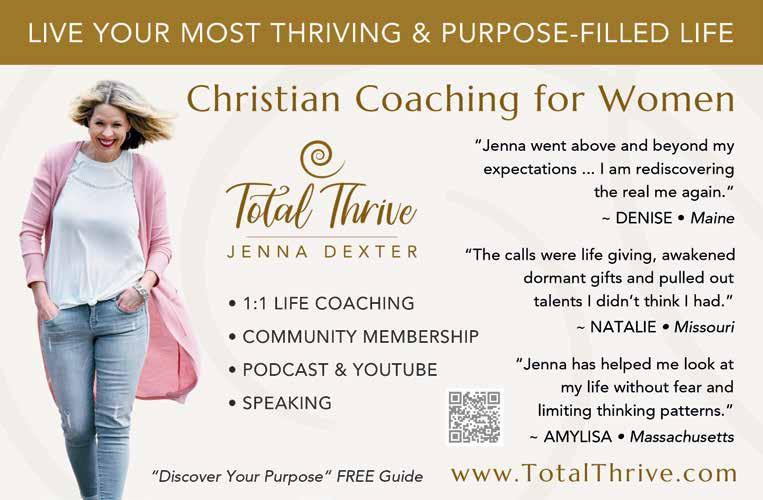
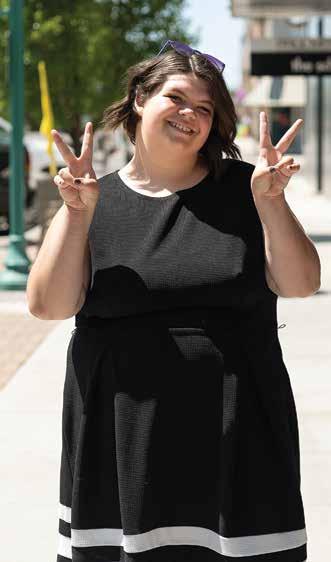
The following information is provided by Wednesday’s Child, an organization that helps Idaho foster children find permanent homes.
Kahli is a quirky teen with an adventurous spirit. This brave girl recently let some of us from Wednesday’s Child tag along on a trip to a local salon, where she chose to cut off all her long hair for a new style that better matches the transformation she’s working on in herself as she heads towards a new life with a future adoptive family.
A sweet girl who can be just a little shy at first, Kahli quickly warms up and shows off her fun personality. She loves going for long drives; riding bikes or scooters; camping; swimming and taking walks. Kahli is in her school choir and enjoys all genres of music. She also plays the piano.
Her favorite school subject is art and she can’t get enough of anything related to anime. Kahli dreams of someday visiting Japan to fully immerse herself in its culture. She loves making cakes, brownies, and pies and has set a goal of becoming a professional baker.
Kahli is a tender-hearted yet resilient girl and is extremely protective of the people she cares about. She finds a sense of purpose in sharing her own difficult life experiences, and how she has overcome things, in ways that might help others. Kahli always tries to be kind to everyone around her and prides herself on how good she is at helping her friends work through struggles in their own lives.
Kahli is SO looking forward to being adopted! She has her sights set on finding her Forever Home with a Christian family, one who will take her to church regularly. She’s open to a traditional family with both a mom and a dad or to a single mom, with no more than one or two other children in the home.
Kahli loves dogs. She describes her relationship with animals as giving her a sense of comfort and connection that just makes everything better. She is really hoping that her adoptive family loves animals as well and that she can have a dog of her own.
Kahli’s Permanency Team is open to hearing from Idaho families, as well as families who reside out of state, and is particularly looking for parents for her who have formal trauma training or a significant understanding of the needs of children who come from hard places. Kahli has several siblings and will need a family who is committed to supporting and nurturing those ongoing sibling relationships. If you feel that your family is just what Kahli has been longing for and you are ready for the adventure of a lifetime to begin, inquire today at www.idahowednesdayschild.org to find out more about this special girl. n
For more information on the Idaho Wednesday’s Child Program, visit www.idahowednesdayschild.org, or contact Specialized Recruitment Services Administrator Shawn White at swhite52@ewu.edu or cell (208) 488-8989.
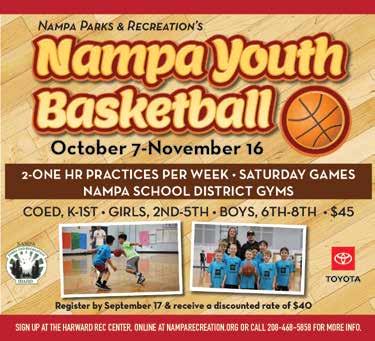

Residents of Meridian and nearby communities will get the chance to open their pantries and hearts to benefit those in need at the seventh annual “Interfaith Community Food Drive” on Sunday, December 8, from 2 to 4:30 p.m. The event will be held at the parking lot of Vertical View Climbing Gym, 1334 E. Bird Dog Drive, near the intersection of Locust Grove and Overland roads. It is sponsored by the Meridian mayor’s Interfaith Council, a group representing churches and charitable organizations in the area.
It is a “no contact” event, according to Shannon Smurthwaite, a member of the Interfaith Council and the event organizer, to make it easy and safe for those who wish to contribute.
“'No contact' means that you simply drive to the parking lot, where you need not even get out of your car. Volunteers, including many of our civic, ecclesiastical, and teen leaders, will accept non-perishable donations from your vehicle’s trunk or through the windows,” Smurthwaite said. “We also accept donations of cash in sealed envelopes, new blankets in all sizes, and Walmart gift cards for local women’s and children’s services.”
The donated items will be distributed among food banks in Meridian and other nearby communities. In past years, thousands of pounds of food were collected and significant cash donated in two hours as a result of the event, all passed on to help curb food insecurities in families needing a little extra help this winter.
“Service to others is an important part of what makes Meridian such an amazing community,” said Mayor Robert Simison, who participates each year. “I appreciate the ongoing efforts of the Interfaith Food Drive to feed those in need.”
For more information, contact Smurthwaite at 406-672-3733 or meridianfriendsoffaith@gmail.com. n

